 08/06/2008 04:15 08/06/2008 04:15 |
|
| | | OFFLINE | | Post: 13.807 | Registrato il: 28/08/2005
| Utente Gold | |
|
Posted today (6/7/08) in the preceding page:
Benedict XVI and President Bush: A personal and political bond - Religion News Service looks at
the unusual relationship between the two, who will meet for the third time in less than a year next week.
The Pope's day - Program today included several meetings, with two major addresses - one to the Pontifical Council
on Inter-Religious dialog, and the other to the sixth annual symposium of European university professors. The English original
of the first and a translation of the second (must-read) has been posted in HOMILIES, DISCOURSES, MESSAGES...Also, the Pope
has named Cardinal Antonelli of Florence as the new President of the Pontifical Council on the Family.
On the finer points of the food Crisis - CNS looks at a briefing paper by the Pontifical Council
on Justice and peace that backstops the Pope's call for the structural changes needed for long-term solutions.
A Pope made for Catholic media - John Thavis of CNS tells Toronto convention that only Catholic media
are capable of reporting the Pope's messages on a sustained basis, unlike the headline-driven secular media.
======================================================================
The meeting yesterday between the Holy Father and the Italian Prime Minister, the Holy See communique about it, along with Berlusconi's interviews given before and after the meeting, seem to point to the recovery of 'healthy secularity' in the nation of which the Bishop of Rome is also the Primate, for the first time since Benedict XVI became Pope. Here is the translation of an editorial in Avvenire one week ago, after the Pope addressed the Italian bishops on the 'new climate' in the nation:
REALISM AND HOPE:
The firm hands of
the worker in the vineyard
Editorial by DAVIDE RONDONI
Translated from
the May 30, 2008 issue of

There is something of the wisdom and the thoughtful attention of a country person in the words of Benedict XVI. He did say, at the start of his Pontificate, that he was a laborer in the vineyard of the Lord.
And it was with the attention and simple joy of the peasant that Benedict XVI yesterday indicated to his bishops [the plenary assembly of the Italian bishops conference] the signs of a possible flowering in the life of the Church and the Italian nation.
Like one who is observing buds with the tremulous hope of someone who is grateful for it and does not wish to expose it to any possibility of inclement weather.
Above all, he called attention to the youth of the land. He dwelt upon the risk that young people would be left 'alone to face the great questions' which arise in life.
For the Pope, the vast 'educative emergency' which is obvious in so many ways, invokes the responsibility of parents, teachers, priests and everyone. And so, he called for "a more marked profile to evangelization during the many forms and occasions of their encounter and presence" in the world of the young. Especially in the schools.
The demand for a better, more urgent response to the educative emergency, the Pope noted, comes 'in the widest social context'. As if to say that many, in Italian society, realize that this particular field must be cultivated, and that the formulas of relativism and skeptical negation can only suffocate life.
In this sense, the Pope, with the patient watchfulness of someone who knows how to till the soil, recognized 'a new climate, more trusting and constructive" which comes from 'the emergence of a more serene relationship between political forces and institutions, by virtue of a more vivid perception of common responsibilities - that is, provided politics sees more clearly towards assuming responsibility for responding to emergencies, in a dialog devoid of poisonous rancor from any side.
The Pope pointed out that 'popular sentiment' as well as the various 'social categories' perceive this new positive possibility. And that is why he welcomes the development with 'particular joy'. Not the joy of a politician, but of a peasant who looks around and at his fields as menacing clouds dissipate.
Which leads to hope. Because hope is the force with which one cultivates. Italy needs a new season of economic growth, said the Pope, but also of civic and moral growth. Whoever knows the art of cultivating development knows that growth must be integral.
But the favorable climate may disappear. The clouds can rapidly condense and hit the fields with bad weather, wash away the budding shoots of confidence.
And the Pope, like the wise peasant, knows that the problem of problems, that which makes all the difference between a field destined to be barren and one meant to bear fruit "remains the question of God".
"No human and social problem," he said, "can really be resolved if God does not return to the center of our lives." Every peasant is a realist: he knows what gives life to the earth.
And so, once more, the Pope calls for healthy secularity, understood as a space in which men of faith can give a fundamental contribution "to clearing up the major social and moral problems" of Italy.
For months, there has been no lack of news and reasons for concern. So there is no need for professional lamenters (the easiest of professions) or prophets of misfortune (another easy occupation, generally exercised by people who are insulated from the more serious problems of existence).
What we need are men with a taste for cultivation and the joy that comes from it - men who have the strength and the patience of the worker in the vineyard.
[Modificato da TERESA BENEDETTA 09/06/2008 18:15] |
|
 08/06/2008 14:52 08/06/2008 14:52 |
|
| | | OFFLINE | | Post: 13.813 | Registrato il: 28/08/2005
| Utente Gold | |
|
ANGELUS TODAY
A full translation of the Holy Father's words has been posted in AUDIENCE & ANGELUS TEXTS.
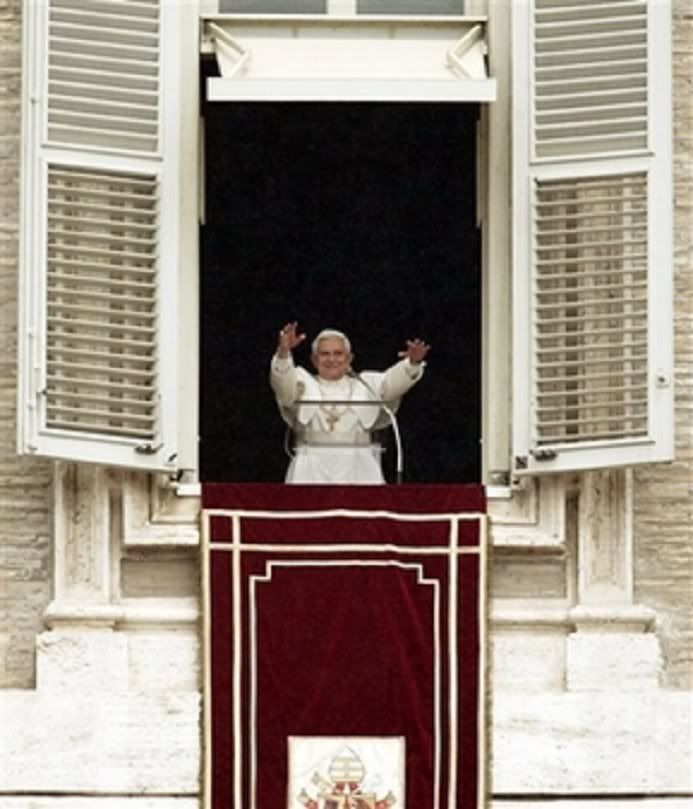
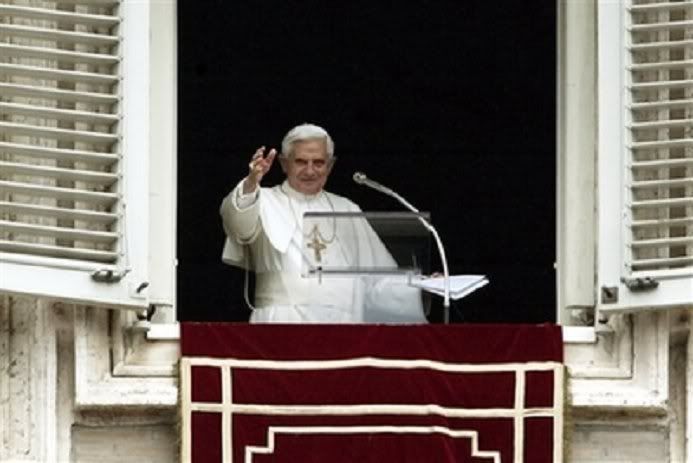
The Holy Father today delivered a mini-homily on the Gospel of the day - how Jesus called Matthew the tax collector to follow him. To Polish-speaking pilgrims, he expressed his condolences and offered prayers for the victims of a mine disaster in Borynia last Wednesday.
In English, he said:
I greet all the English-speaking visitors present at today’s Angelus, especially the group of pilgrims from Malmö in Sweden. I pray that your visit to Rome may strengthen your faith and deepen your love for Jesus Christ, our Lord and Saviour.
In this Sunday’s Gospel, we hear how Jesus called Matthew, the tax collector. Immediately Matthew rose and became a follower of our Lord.
Let us be prepared to turn away from everything that separates us from God, so that we too can respond generously to his call.
Upon all of you here today, and upon your families and loved ones at home, I invoke God’s abundant blessings.
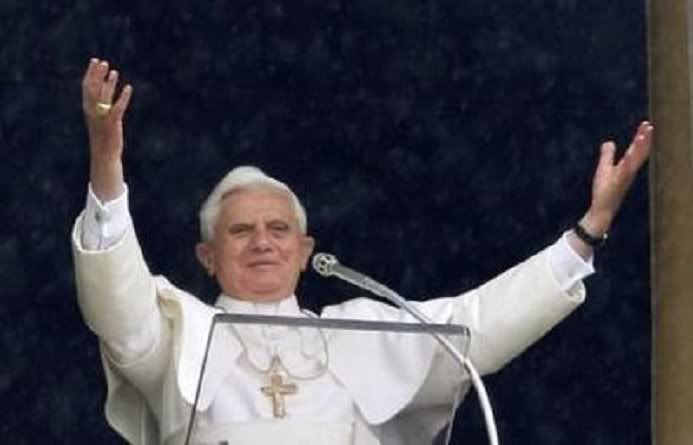
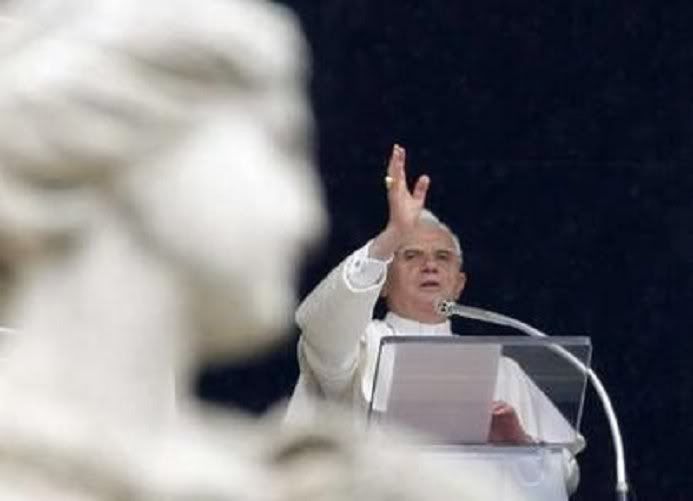
=====================================================================
Sidebar to today's Angelus:
Nun protests eviction
from cloisters
Reuters filed these photos today without further details other than what is given in their photocaption:
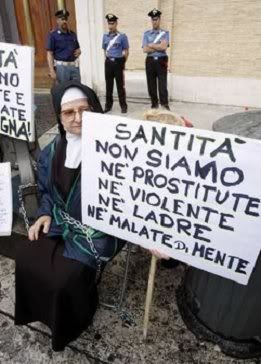 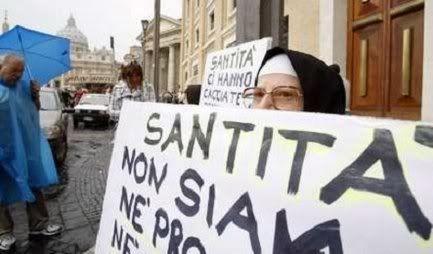
Sister Albina Locantore protests as she is chained to a lamppost outside the Vatican June 8,2008. Locantore is one of two elderly Italian nuns protesting claiming they had been wrongly expelled from their cloistered convent and wanted Pope Benedict to help them return. The placard reads, ""Your Holiness, we are neither prostitutes, nor violent, nor thieves, nor mentally infirm".
Where the convent is located, why the nuns were evicted, how many nuns are involved, where do they live now, has their protest been taken up to someone in the Vatican, etc. - I hope we can learn more. Here's a story that doesn't really tell us much more - and even sounds screwy.
Protesting nuns
 TWO nuns chained themselves in front of the Vatican to get Pope Benedict XVI's attention, claiming they had been turned away from their convent.
TWO nuns chained themselves in front of the Vatican to get Pope Benedict XVI's attention, claiming they had been turned away from their convent.
Dressed in Carmelite habits, the nuns said they had not been allowed back into their convent in central Italy when they returned after leaving for health reasons in 2005.
"After 50 or 60 years of monastic life dedicated to the Church, we were thrown helpless into the street like two bags of garbage,'' said Sister Albina Locantore, 73, who had chained herself along with 79-year-old Sister Teresa Izzi.
The unusual protest took place near where the Pope gives his Sunday noon Angelus prayer from his office window overlooking Saint Peter's Square.
The Vatican did not comment.
The ANSA news agency cited articles from local media claiming the two women were evicted after an inspection by church authorities revealed the presence of a man in the convent.
The articles, dating from 2007, suggested the man had extorted money from the convent through the nuns.
"That's all lies,'' the two nuns were quoted as saying by ANSA.
[Modificato da TERESA BENEDETTA 09/06/2008 05:49] |
 08/06/2008 16:54 08/06/2008 16:54 |
|
| | | OFFLINE | | Post: 13.815 | Registrato il: 28/08/2005
| Utente Gold | |
|
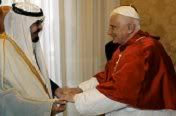 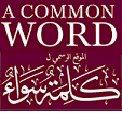 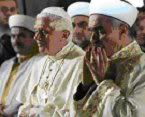 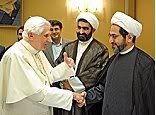  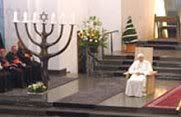 I am posting this here because ultimately, it has been one of the more striking consequences of Benedict XVI's Regensburg lecture. Earlier stories centered on King Abdullah and the Muslim meeting he called in Mecca were posted in
I am posting this here because ultimately, it has been one of the more striking consequences of Benedict XVI's Regensburg lecture. Earlier stories centered on King Abdullah and the Muslim meeting he called in Mecca were posted in NOTABLES.
Muslim clerics support King Abdullah
on plan for talks with Christians, Jews

RIYADH, Saudi Arabia, June 8 (Reuters) – King Abdullah has won backing from Muslim clerics from around the world for an interfaith dialogue with Christians and Jews, state media reported yesterday.
About 500 religious scholars and academics gathered for a three-day conference in Mecca that ended Friday as the first step of a plan announced by the Saudi king this year to create a dialogue with other faiths.
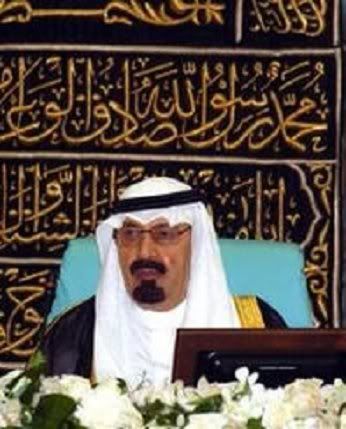 King Abdullah at the Mecca meeting.
King Abdullah at the Mecca meeting.
The King's call, which followed a meeting with Pope Benedict XVI at the Vatican last year, sparked much interest from Jewish and Christian groups around the world.
The Mecca meeting stressed the need for dialogue with other religions to give a “correct picture of Islam” and to reach out “to other sects of Islam, which will lead to uniting the nation,” the official Saudi Press Agency said.
It said the participants, who included Egypt's Grand Sheik of al-Azhar Mohamed Sayed Tantawi and former Iranian President Akbar Hashemi Rafsanjani, established that a dialogue with other faiths was legitimate in Islam.
The agency gave no more details, but a gathering of Jewish and Christian clerics in Saudi Arabia would be groundbreaking.
Saudi Arabia, home to Islam's holiest sites, sees itself as the leader of Sunni Islam. It promotes a hard-line school of Islam called Wahhabism, which has traditionally seen some other Muslims and non-Muslims as “infidels.”
But Riyadh has been making efforts to improve its international image after the Sept. 11, 2001, attacks, in which 15 of the 19 attackers were Saudi. Saudi Islamist militants also launched a violent campaign to overthrow the monarchy in 2003, denouncing the rulers as un-Islamic.
Although the official religious establishment is on board for the King's interfaith effort, many Wahhabi clerics remain opposed even to talking to Shiite Muslims.
A group of independent clerics issued a statement last week saying Shiites, including the Lebanese group Hezbollah, were posturing against Israel to hide an anti-Sunni agenda.
Some Shiites said that despite the presence of Iran's Rafsanjani, few of their number were invited to the Mecca meeting. None came from Europe or North America; one came from Saudi Arabia's own Shiite minority, which complains that it is given second-class status.
|
 09/06/2008 02:18 09/06/2008 02:18 |
|
| | | OFFLINE | | Post: 13.821 | Registrato il: 28/08/2005
| Utente Gold | |
|
  Inaugurated today:
Inaugurated today:
The first 'personal parish' in Rome
authorized by Benedict XVI for
devotees of the traditional Mass

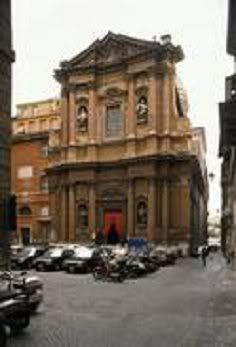 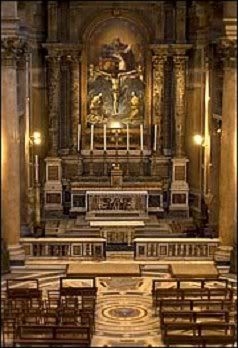 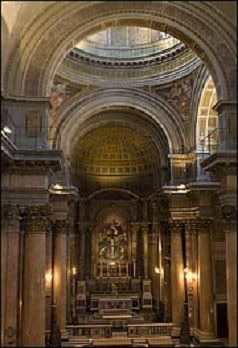
The first personal parish authorized by Pope Benedict XVI for devotees of the traditional Mass who live in the Diocese of Rome officially opened today with Mass and the installation of its first pastor, Fr. Joseph Kramer, rector of the Fraternity of St. Peter (FSSP).
The decree establishing the new parish, issued by the Pope last Easter Sunday, states that in conformity with Art. 10 of Summorum Pontificum, “and after having received the proposal of the Cardinal Vicar, the Holy Father has established that in the central sector of the Diocese of Rome, in the 1st District, and in a fitting place of worship, namely, the Church of Ss. Trinità dei Pellegrini ai Catinari . . . there should be erected a personal parish, in order to guarantee proper pastoral care for the entire community of Traditionalist faithful residing in the same Diocese”.
Cardinal Darío Castrillón Hoyos, president of the Pontifical Commission Ecclesia Dei, said that the establishment of the personal parish was 'an important act' which applies a special provision of the Pope's Motu Proprio to Rome. [It is also the first personal parish ever established by Benedict XVI.]
"The realization of a personal parish also has an exemplary value for other dioceses, both in Italy and elsewhere," he added.
The church, attached to the Archconfraternity of the Holy Trinity of pilgrims and convalescents, is a subsidiary of the parish of Saints Biagio and Carlo in Catinari, in the central pastoral sector of the diocese.
The establishing decree says that the parish priests of SS Trinita have the same rights, duties and obligations as those in the other parishes of Rome, and will follow the guidlines for parish administration and maintenance sent forth by the Italian bishops conference and the Vicariate of Rome.
The Priestly Fraternity of St. Peter is a Clerical Society of Apostolic Life established by pontifical decree in 1988 as a community of Roman Catholic priests who do not take religious vows, but who work together for a common mission in the world.
The mission of the Fraternity is two-fold: first, the formation and sanctification of priests in the context of the traditional liturgy of the Roman rite, and secondly, the pastoral deployment of the priests in the service of the Church.
Of the many dioceses served by the FSSP, this is the tenth apostolate which has been erected as a full personal parish, and the first in Europe.
The FSSP said it hopes that this particular parish will serve not only local parishioners, but that it will also provide a fine example of the beauty and solemnity of the extraordinary form of the Roman Rite to the many pilgrims and students in Rome.
The FSSP has a special link to Benedict XVI. Shortly after the Fraternity's foundation, Joseph Ratzinger requested Bishop Joseph Stimpfle of Augsburg, Germany, to grant the Fraternity a home in Wigratzbad, a Marian shrine in Bavaria that now lodges the Fraternity's European seminary.
That same month of October, 1988, a handful of priests and some thirty seminarians arrived at Wigratzbad ready to start "from scratch." In 1999, Cardinal Ratzinger celebrated the traditional Mass in Wigratzbad, durign which he obtained new priests for the FSSP.
The FSSP now has over 170 priests and 120 seminarians. In addition to the original seminary at Wigratzbad, the FSSP has a second international seminary located in Lincoln, Nebraska.
It has priests serving in France, Germany, Switzerland, Austria, Italy, the USA, Australia, Canada, Great Britain , Nigeria and Benin, where they work with the full approval of the Holy See and the permission of local bishops, providing a full sacramental life for the faithful, administered according to the liturgical books of 1962.
======================================================================
The Church of SS Trinita dei Pellegrini has some admirable art treasures which may be seen in the 'Gallery' section of the FSSP-Rome website:
roma.fssp.it/inglese/gallery.html#
It has the only picture available online (fourth thumbnail on the first row) - as far as I have searched - of the Florentine painter Iacopo Zucchi's Mass of St. Gregory the Great painted in 1672, now fittingly found in the sacristy of the Church. Unfortunately, the image cannot be copied.
But the greatest treasure in the Church is the 1625 altarpiece by Guido Reni depicting the Trinity:
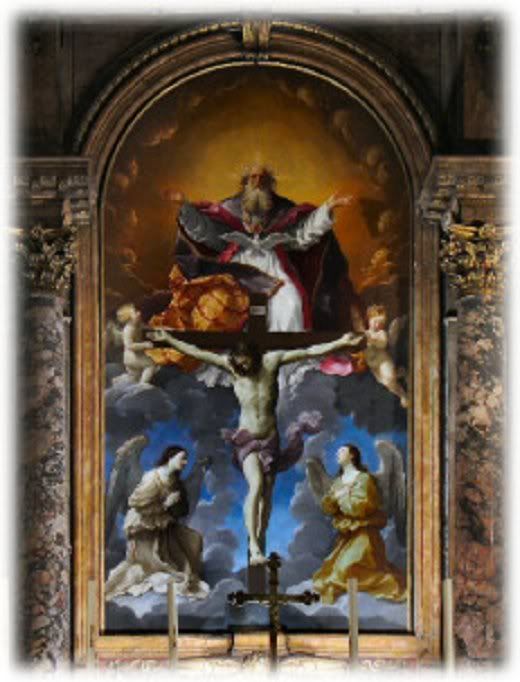
=====================================================================
Here is a report from Corriere della Sera on the inaugural Mass at
SS. Trinita:
Many young people at
inauguration of first personal parish
for the traditional Mass
By Carlotta De Leo Ester Palma

A very well-attended solemn Mass at 10 a.m. and another one at 6:30 p.m. yesterday, both said rigorously in Latin - that was the first day of the new personal parish of Santissima Trinita dei Pellegrini in the piazza of the same name near the Campo dei Fiori in central Rome.
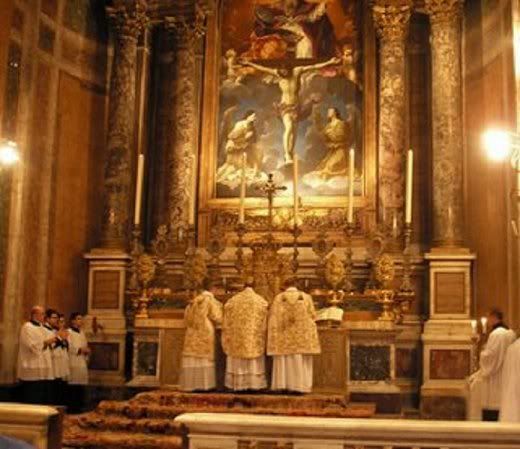 File photo of traditional Mass at SS.Trinita.
File photo of traditional Mass at SS.Trinita.
The 17th century church, which is famous for Guido Reni's painting of the Trinity as its altarpiece, yesterday actually became the first personal parish in Italy dedicated to the traditional pre-1969 Mass, now called the extraordinary form of the Roman rite.
An example for other churches around the world, according to Cardinal Camillo Ruini, who created the parish under a provision of Benedict XVI's motu proprio Summorum Pontificum. A personal parish is distinguished by being dedicated to pastoral service for a specific group of people rather than to inhabitants of a limited territory (as in the regular parish).
"I hope that this gives birth to a true parochial community, and I encourage everyone to support this initiative," said Mons. Ernesto Mandara, in a homily yesterday. Mandara is the Auxiliary Bishop for the central sector of Rome.
More than 500 people crowded the small church, many of them young people, as well as families with children and babies. Many had to remain outside the church for lack of space.
"It was very moving to see so many new faces and to disover that many are familiar with the traditional rite," said Fr. Joseph Kramer, the Australian who was named parish priest and who came to Rome in 1977. "It represents for us a confirmation that in the past 30 years, our congregation, the Priestly Fraternity of St. Peter's (FSSP), chose the right path. We started in obscurity, and thanks to the Holy Fahter, here we are."
Fr. Kramer said he will concentrate on the younger parishioners, for whom he plans preparatory courses on the Eucharist and matrimony, and on pilgrims and visitors to Rome. Confessors wlll be able to accommodate the faithful in many languages.
"I know that our experience will be followed with great interest even abroad, and I hope that other parishes like ours will be born."
Until the church was assigned to the personal parish, it had been used by the Sant'Egidio Community, a church movement, but Cardinal Ruini has seen to it that an internal appropriate arrangement would be made to define sharing of the space and harmonious schedules between Sant'Egidio and FSSP.
=====================================================================
6/11/08 P.S. Shawn Tribe of thenewliturgicalmovement.blogspot.com/

was in Rome for the historic first Mass reported above, and has filed some photos on the blog, including these:
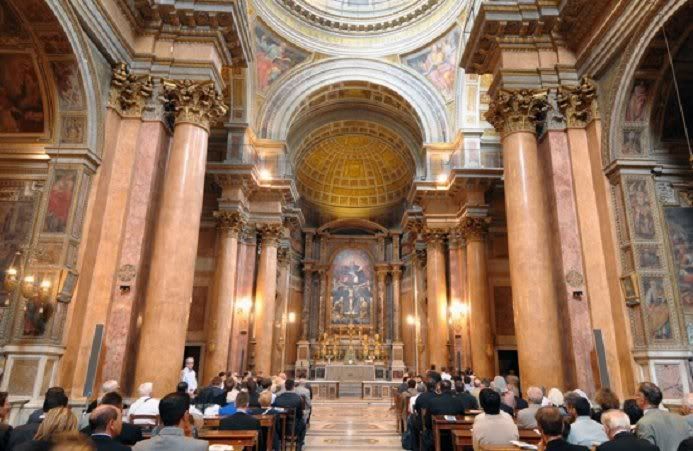
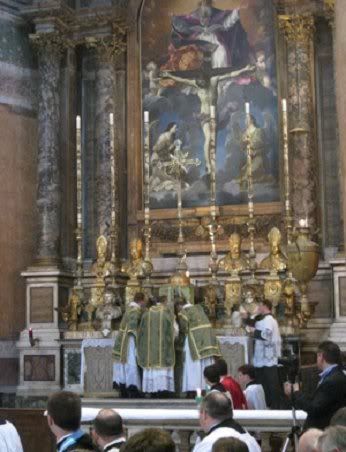 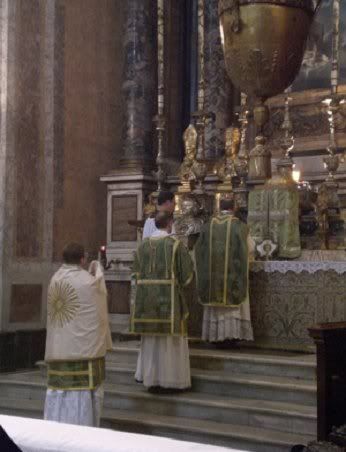
[Modificato da TERESA BENEDETTA 11/06/2008 17:09] |
 09/06/2008 05:32 09/06/2008 05:32 |
|
| | | OFFLINE | | Post: 13.824 | Registrato il: 28/08/2005
| Utente Gold | |
|
Vatican looks to modern artists
for fresh talent with divine inspiration
By Andrew Johnson

Sunday, 8 June 2008
Pope Benedict XVI has launched a campaign for a new era of religious art to rival the works of the Medicis.
As religious themes become increasing influential among contemporary artists, the Holy See, which governs the Catholic Church, is searching for rich patrons to sponsor works in new houses of worship designed by cutting-edge architects.
In an attempt to "lead by example", the Pontifical Council for Culture is now setting up a committee to find "world-famous" contemporary artists it can commission to produce new religious and spiritual works.
These will be shown during next year's Venice Biennale, which the Vatican will attend for the first time and which it once dismissed as a "debacle" that demonstrated "the breakdown of art in modern times". One UK-based benefactor, who wants to remain anonymous, has already been found to sponsor this project.
"We are trying to get a dialogue up and running between the church and contemporary art – particularly artists at the highest level," said Monsignor Gianfranco Ravasi, the president of the Pontifical Council for Culture.
"We are looking for world-famous people. Venice is a showcase for all the big countries in the world and the Holy See would like to be there too. We're trying to get the best of international artists on our side who can create new works with a religious or spiritual subject."
Christianity has formed a cornerstone of Western art for 1,500 years, with themes such as the Adoration of the Magi or the Last Supper inspiring the likes of Botticelli and Leonardo da Vinci. Long gone, however, are the days when a Pope, such as Julius II who commissioned Michelangelo to paint the ceiling of the Sistine Chapel or Raphael to paint his portrait, could command the greatest artists of the day.
The rise of abstract and conceptual art has seen the once-dominant influence of the church decline as it continued to rely on figurative work. An attempt by Pope Paul VI in the 1960s to embrace contemporary art was stymied by traditionalists.
Now, however, the Holy See wants to "revive" its role in inspiring art, and inspiring others to pay for it. Mgr Ravasi suggested a presence at Venice would hopefully kick-start the Vatican's ongoing involvement in contemporary art.
These works would enhance magnificent new churches designed by some of the world's most renowned architects, such as Renzo Piano's Padre Pio Pilgrimage Church in central Italy and Richard Meier's Jubilee Church in Rome.
"The [current] art works are not at the same level as the buildings," Mgr Ravasi said. "So we are trying to bring the art up to the same level as the architecture."
While no artists have yet been identified, Mgr Ravasi said the British sculptor Anish Kapoor was the type of artist they were looking for.
The Turner Prize-winner Mark Wallinger may also be considered after his Via Dolorosa – an 18-minute film that silently replays the crucifixion scene from Franco Zeffirelli's 1977 TV drama Jesus of Nazareth – was temporarily displayed in Milan's cathedral in 2005.
Tim Marlow, exhibitions director at London's White Cube Gallery, which displays many of Britain's biggest artists, said that there has been a recent trend for church buildings to show temporary exhibitions.
"I think it's a brave and important initiative by the church. Contemporary artists such as Damien Hirst, Chris Ofili and Sam Taylor-Wood do include religious iconography in their work but it is in a critical and questioning manner. I wonder whether the church can commission work that is both provocative and questioning."
The curator and writer Giles Waterfield added that there was scope for contemporary art in churches, pointing to Olafur Eliasson's The Weather Project, the giant sun which lit up the Tate Modern's Turbine Hall in 2003-04. He warned, however, that the emphasis should be quality of art rather than the fame of the artists.
There is still resistance in the Church to modern art, however. Last year the German artist Gerhard Richter unveiled his new stained-glass window in Cologne Cathedral, a mosaic of 11,200 coloured squares in a pattern randomly generated by computer to suggest the work of the divine in seeming chaos.
It was denounced by the city's Catholic Cardinal Joachim Meisner, who said "it belongs in a mosque, or another house of prayer, not this one".
[Modificato da TERESA BENEDETTA 09/06/2008 05:33] |
 09/06/2008 15:49 09/06/2008 15:49 |
|
| | | OFFLINE | | Post: 13.826 | Registrato il: 28/08/2005
| Utente Gold | |
|
  Pope to host Bush
Pope to host Bush
in unusual Vatican setting
by Philip Pullela

VATICAN CITY, June 9 (Reuters) - Pope Benedict will unusually host talks with U.S. President George W. Bush in a restored medieval tower on Friday, to repay him for a warm reception at the White House, the Vatican said.
The Pope usually receives heads of state in his private study in the Apostolic Palace, overlooking St Peter's Square.
But Vatican spokesman Federico Lombardi said the change was to repay Bush for "the cordiality of the meeting at the White House" when the Pope visited the United States in April.
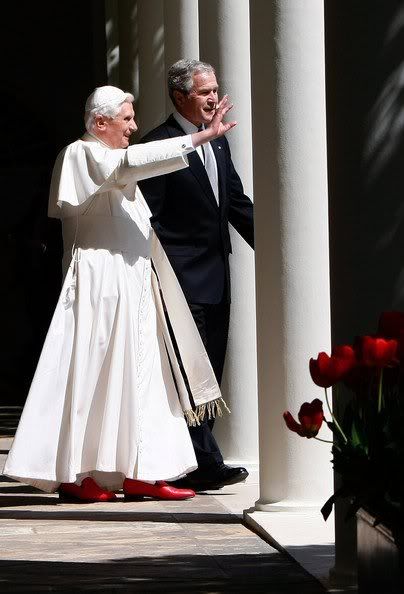
St. John's Tower (Torre San Giovanni) is a round structure on a hilltop inside the Vatican gardens that is sometimes used as a residence for important guests.
After their private talks, Bush and the Pope will stroll in the gardens to see a statue of the Madonna.
The late Pope John XXIII, who reigned from 1958 to 1963, restored the tower as a place where he could work in peace.
Bush will be in Rome from Wednesday to Friday as part of a trip to Slovenia, Germany, Italy, France and Britain.
Vatican to scrap formal protocol
at the third meeting between
Pope Benedict and President Bush
By Carol Glatz

VATICAN CITY, June 9 (CNS) -- When Pope Benedict XVI and U.S. President George W. Bush meet at the Vatican June 13, they will scrap the usual formal protocol and instead hold talks and take a leisurely stroll in the Vatican Gardens.
The Vatican opted for the "particular" and "unusual" setting as a way to show its appreciation for "the cordial welcome and meeting held at the White House" during the Pope's April 15-20 visit to the United States, Jesuit Father Federico Lombardi, Vatican spokesman, said June 9.
Normally heads of state visiting the Pope at the Vatican are taken with much fanfare to the Pope's library in the main Apostolic Palace.
But "in light of the (Pope's) recent pastoral visit to the United States and the United Nations" and for the warm welcome and hospitality shown the Pope during his meeting with Bush on the Pope's birthday, April 16, an informal setting at the Vatican was chosen instead, said Father Lombardi.
Father Lombardi said Pope Benedict will meet the President and his wife, Laura Bush, at 11 a.m. at the entrance of St. John's Tower, which is located at the westernmost tip of the Vatican Gardens .
The Pope and Bush will go to a study on the top floor of the tower to hold closed-door talks after which the two men "will take a brief stroll in the Vatican Gardens," the spokesman said.
This will be Bush's third meeting with Pope Benedict and his second audience with the German pope at the Vatican. As President, Bush met with Pope John Paul II three times.
Bush is making the trip as part of a wider European tour to attend a U.S.-European Union summit in Slovenia; he also will meet government leaders when he visits Germany, Italy, France and the United Kingdom.
=====================================================================
I cannot wait to see the spin - most likely, negative - that the MSM, particularly in the USA, will put on this story. The Pope's friendship must mean a lot to President Bush, whom less than 30% of his countrymen think of favorably, according to the polls, and is probably even more unpopular in Europe. Whatever you think of him, he has shown unusual political courage in standing firm for the things he believes right (including the invasion of Iraq and his decision to stick with the Iraqis until they are reasonably stable), not to mention his pro-life policies) even if he knows they are unpopular.
L'Osservatore Romano, in its June 9-10 issue, gives prominent play to the Vatican departure from protocol as well as to the start of Bush's 'farewell tour' of Europe as President. The articles occupy the right side of Page 1.
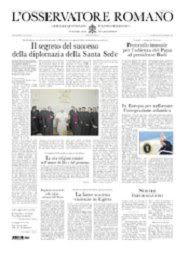 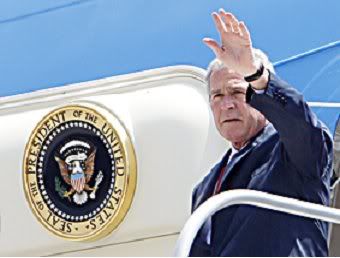 Here's how OR reports the story:
Friday, June 13, at the Vatican:
Here's how OR reports the story:
Friday, June 13, at the Vatican:
Unusual protocol for Pope's
audience with President Bush
Translated from
the June 9-10 issue of

Pope Benedict XVI has decided on an unprecedented protocol, in informal familiar style, to return the warm welcome that he received during his recent visit to the United States: his audience at the Vatican for President George W. Bush, scheduled for Friday, June 13, will take place in unusual form.
According to the special protocol from the Prefect of the Pontifical Household, Benedict XVI will welcome President Bush at 11 a.m. at the entrance to the Torre di San Giovanni in the Vatican Gardens. Papal audiences with heads of state and/or government have always taken place in the Apostolic Palace [both in the Vatican and in Castel Gandolfo].
President Bush will be accompanied by his wife Laura and by the US Ambassador to the Holy See, Mary Ann Glendon.
The Pope and the President will then proceed to a study on the top floor where they will have a private meeting. Mrs. Bush and Ambassador Glendon will remain with Cardinal Tarcisio Bertone, the Pope's Secretary of State.
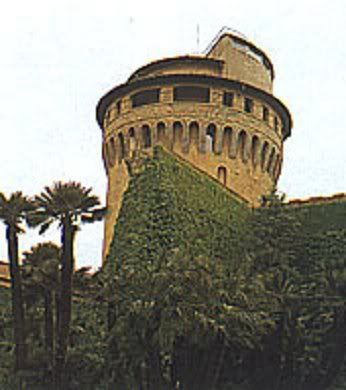 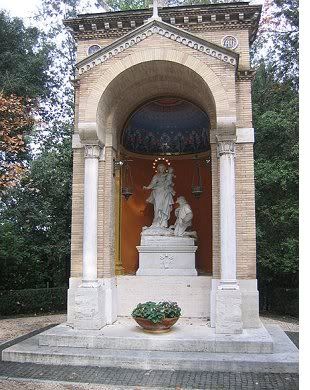 The Torre di San Giovanni; and the shrine of the Madonna della Guardia.
The Torre di San Giovanni; and the shrine of the Madonna della Guardia.
After their meeting, the Pope and the President will take a brief walk in the Vatican Gardens to the shrine of the Madonna della Guardia (Our Lady of the Watch, Genoa's patroness), where the Sistine Chapel Choir will perform two motets.
The Friday meeting will be Bush's second visit to Benedict XVI at the Vatican. The first one took place on June 9 last year. They met next in Washington, DC, during the Pope's apostolic visit to the US.
Bush personally welcomed the Pope at Andrews Air Force Base on his arrival from Rome, an unprecedented gesture, since US presidents have never welcomed visiting heads of state at the airport. [However, President Regan welcomed John Paul II at Miami airport in 1985, and President Clinton welcomed him in Denver airport in 2000.]
The next day, the formal welcome at the White House, which coincided with the Pope's 81st birthday, took place in an atmosphere of great warmth.
[Modificato da TERESA BENEDETTA 10/06/2008 16:55] |
 09/06/2008 18:24 09/06/2008 18:24 |
|
| | | OFFLINE | | Post: 13.828 | Registrato il: 28/08/2005
| Utente Gold | |
|
  Perhaps because the address was given on a weekend, CNS has a belated story on the Pope's discourse to the annual symposium of European university professors Saturday, which I thought to be a concise natural extension of his Regensburg and Sapienza lectures, insofar as the need to widen the horizons of reason to include the transcendent, and the necessary relationship between theology and philosophy. I posted the VIS account of it in THE POPE'S DAY for 6/7/08 in the preceding page and the translation of the text in HOMILIES, DISCOURSES & MESSAGES soon after - a must-read..
Pope calls for re-emphasis
Perhaps because the address was given on a weekend, CNS has a belated story on the Pope's discourse to the annual symposium of European university professors Saturday, which I thought to be a concise natural extension of his Regensburg and Sapienza lectures, insofar as the need to widen the horizons of reason to include the transcendent, and the necessary relationship between theology and philosophy. I posted the VIS account of it in THE POPE'S DAY for 6/7/08 in the preceding page and the translation of the text in HOMILIES, DISCOURSES & MESSAGES soon after - a must-read..
Pope calls for re-emphasis
on study of philosophy
By John Thavis

VATICAN CITY, June 9 (CNS) -- Pope Benedict XVI called for a re-emphasis on the study of philosophy in universities, as part of a more intense dialogue between faith and reason.
At the same time, philosophy must accept the contribution of religion -- not just in the private realm of belief, but as part of the total human experience that gives meaning to life, he said.
The Pope made the comments June 7 in a speech to university professors from 26 European countries who were meeting in Rome to discuss the theme "Widening the Horizons of Rationality."
The Pope said he was encouraged that modern philosophy has seen some openness to the contributions of theology and religions, in particular, Christianity.
"The new dialogue between faith and reason that is required today cannot happen in the terminology and the ways in which it was done in the past. In order to avoid being reduced to a sterile intellectual exercise, it must begin with the real, concrete human situation," he said.
He quoted his own book, Introduction to Christianity, which he wrote as a cardinal, to underline that Christianity has at its roots a deep connection with philosophy and the search for truth. That is important in the modern age, when religions are sometimes manipulated for other aims, he said.
But the Christian message, he said, "is not only informative, but also performative."
"That means that from the beginning the Christian faith cannot be closed into the abstract world of theory, but must be brought down into historic, concrete experience that reaches man in the deepest part of his being," he said.
This is the area where a renewed dialogue between theology and philosophy can bear fruit, he said.
In that regard, he asked the professors to promote high-profile academic centers which focus on theological-philosophical dialogue.
|
 09/06/2008 19:24 09/06/2008 19:24 |
|
| | | OFFLINE | | Post: 13.830 | Registrato il: 28/08/2005
| Utente Gold | |
|
  THE POPE'S DAY, 6/9/08:
THE POPE'S DAY, 6/9/08:
The Holy Father met today with
- Mons. Osvaldo Padilla, Apostolic Nuncio to Korea and Mongolia
- Bishops of Bangladesh on ad-limina visit, accompanied by
- Mons. Beniamino Stella, Apostolic Nuncio to Bangladesh, and President of the Pontifical
Ecclesiastical Academy.
- Professors and students of the Pontifical Ecclesiastical Academy. Address in Italian.
At 5:30 p.m., he is scheduled to go to St. John Lateran Basilica to open the Diocesan Convention
of Rome on the theme, "Christ is risen: Educating in hope through prayer, action and suffering".
The Vatican today released the official programs for the Holy Father's pastoral visit to Santa Maria di Leuca and Brindisi in southeastern Italy this weekend.
THE SECRET OF PRIESTLY MINISTRY
IS UNITY WITH CHRIST
 
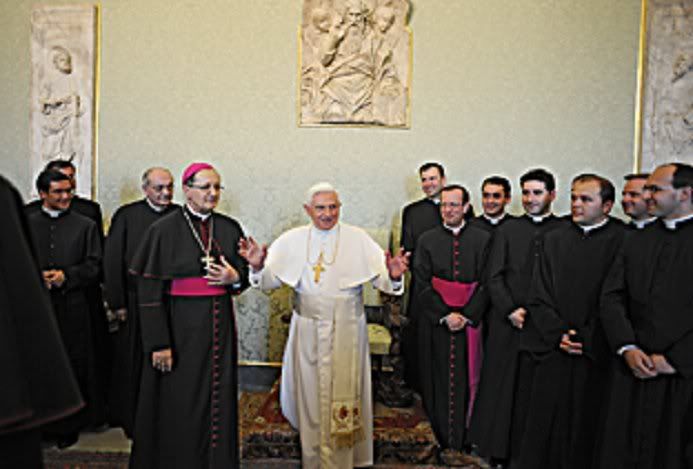
VATICAN CITY, 9 JUN 2008 (VIS) - This morning in the Vatican, the Pope received students from the Pontifical Ecclesiastical Academy, the institution which trains candidates for the Holy See diplomatic service. They were accompanied by Archbishop Beniamino Stella, president of the academy.
"Apart from the necessary juridical, theological and diplomatic training", the Pope told them, "what is most important is that your lives and activities should reflect a faithful love for Christ and for the Church which arouses in you a friendly pastoral concern towards everyone".
"Unity with Christ is the secret of authentic success for the ministry of each priest. Whatever work you undertake in the Church, ensure that you always remain His true friends, faithful friends who have met Him and have learned to love Him above all else. Communion with Him, the divine Master of our souls, will ensure you serenity and peace even in the most complex and difficult moments".
Faced with the danger "of losing the meaning of life", and of "a certain contemporary culture that casts doubt upon any kind of absolute value, even the possibility of recognising truth and goodness", said Pope Benedict, "we must bear witness to the presence of God, a God Who understands man and knows how to speak to his heart".
"You must proclaim - with your lives even before than with your words - the joyful and consoling announcement of the Gospel of love, in places sometimes very far removed from the Christian experience", the Holy Father told his audience. "Announce the Truth that is Christ! May prayer, meditation and listening to the Word of God be your daily bread".
He went on: "May the celebration of the Eucharist be the core and the focus of your every day and of your entire ministry. ... It is not possible to approach the Lord every day, to pronounce these tremendous moving words, 'this is my Body, this is my Blood', ... to take the Body and Blood of the Lord in our hands, without allowing ourselves to be seized by Him, ... without allowing His infinite love to change us within. May the Eucharist become a school of life for you, in which Jesus' sacrifice on the Cross teaches you to give yourselves totally to your fellow man.
"In undertaking their mission, pontifical representatives are called to offer to others this testimony of welcome, fruit of their constant union with Christ", he concluded.
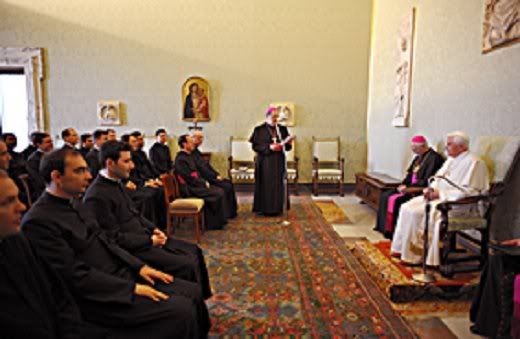 Mons. Stella addresses the Holy Father at the meeting today.
If you are united to Christ,
Mons. Stella addresses the Holy Father at the meeting today.
If you are united to Christ,
you will be successful,
Pope tells future diplomats
of the Holy See

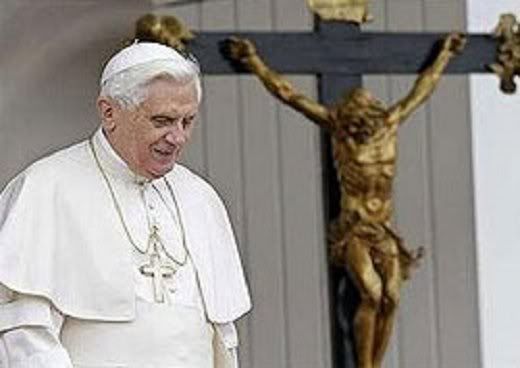
Vatican City, Jun 9, 2008 (CNA).- On Monday morning candidates from the Holy See’s school for training diplomats had the opportunity to meet with Pope Benedict XVI. The key to success in their work, the Pope said, is to love and remain united to Christ and the Church.
The students of the Pontifical Ecclesiastical Academy, the institution which trains candidates for the Holy See diplomatic service, along with Archbishop Beniamino Stella, president of the academy, heard the Holy Father explain his insight into their service.
"Apart from the necessary juridical, theological and diplomatic training", the Pope told them, "what is most important is that your lives and activities should reflect a faithful love for Christ and for the Church which arouses in you a friendly pastoral concern towards everyone."
Regardless of what specific task they are called to, the Pope said that, "Unity with Christ is the secret of authentic success for the ministry of each priest.” He continued, saying, “ensure that you always remain His true friends, faithful friends who have met Him and have learned to love Him above all else. Communion with Him, the divine Master of our souls, will ensure you serenity and peace even in the most complex and difficult moments."
The Pope also addressed the pitfalls of the world that the future diplomats will minister in.
Faced with the danger "of losing the meaning of life," and of "a certain contemporary culture that casts doubt upon any kind of absolute value, even the possibility of recognizing truth and goodness", said Pope Benedict, "we must bear witness to the presence of God, a God Who understands man and knows how to speak to his heart."
"Announce the Truth that is Christ!” he encouraged the men. “May prayer, meditation and listening to the Word of God be your daily bread."
Also of great importance is the daily celebration of the Eucharist, the Holy Father said as he reflected on the source of strength and love that can be found there. “It is not possible to approach the Lord every day, to pronounce these tremendous moving words, 'this is my Body, this is my Blood', ... to take the Body and Blood of the Lord in our hands, without allowing ourselves to be seized by Him, ... without allowing His infinite love to change us within. May the Eucharist become a school of life for you, in which Jesus' sacrifice on the Cross teaches you to give yourselves totally to your fellow man.”
Benedict XVI finished his address by telling the diplomats in training that their role is to offer the fruit of their union with Christ to those they minister to.
[Modificato da TERESA BENEDETTA 09/06/2008 19:39] |
 10/06/2008 02:17 10/06/2008 02:17 |
|
| | | OFFLINE | | Post: 13.836 | Registrato il: 28/08/2005
| Utente Gold | |
|
  As usual when the Holy Father has a major address, and in the absence of a prepared text released to them beforehand, the Italian news agencies report it in snippets as he delivers it, especially when it is a speech delivered after 3 p.m. when the Vatican press office ends its working day. This is a composite of some reports by SIR, the news agency of the Italian bishops conference.
As usual when the Holy Father has a major address, and in the absence of a prepared text released to them beforehand, the Italian news agencies report it in snippets as he delivers it, especially when it is a speech delivered after 3 p.m. when the Vatican press office ends its working day. This is a composite of some reports by SIR, the news agency of the Italian bishops conference.
A full translation of the Holy Father's address has been posted in HOMILIES, DISCOURSES, MESSAGES.
Benedict XVI to
Rome's diocesan convention:
'Love, not science,
will redeem man'

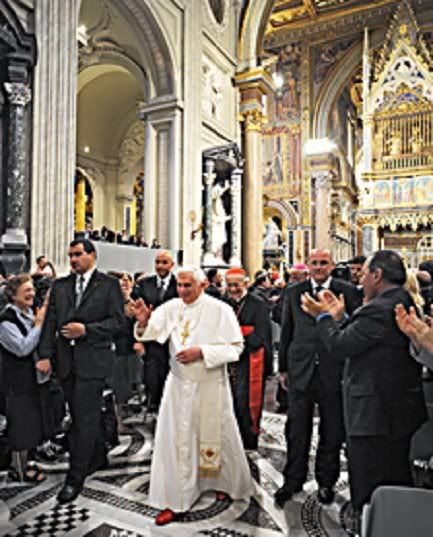 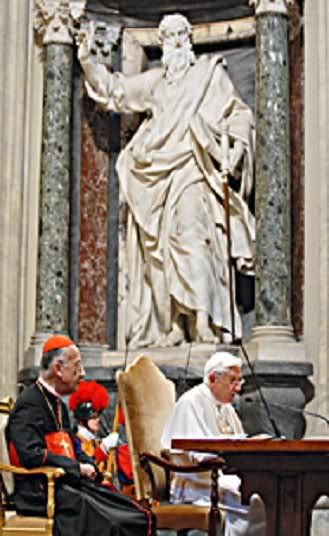
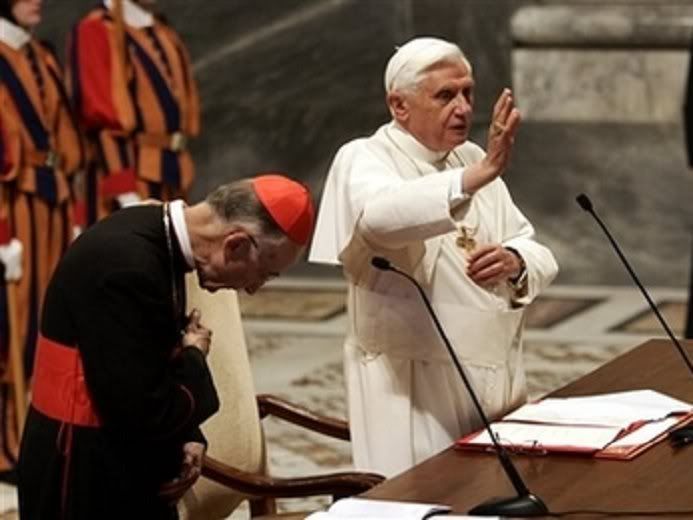 The Holy Father and Cardinal Camillo Ruini, who will retire as his Vicar in Rome in two weeks.
The Holy Father and Cardinal Camillo Ruini, who will retire as his Vicar in Rome in two weeks.
ROME, June 9 (Translated from SIR) - "It is not easy today to live under the sign of Christian hope," Pope Benedict XVI said this evening, in opening the annual pastoral convention of the Diocese of Rome at the Basilica of St. John Lateran, the cathedral of Rome.
The theme of the convention is "Jesus has risen: Educating for hope in prayer, action and suffering."
"What often prevails are attitudes of mistrust, disappointment and resignation which contradict not only the great hope, but even the small hopes that sustain us in our daily life," the Pope said.
In particular, the Pope notes that "the feeling is widespread that for Italy, as well as for Europe, the best years are behind us," and that what looms for the new generations is "a destiny of precariousness and uncertainty".
Against that, "our best expectations are being focused on science and technology as though they alone could bring a solution to our problems".
"It would be senseless to deny or minimize the contribution of science and technology to the transformation of the world and of the concrete conditions of life. Equally myopic would be to ignore it," he continued.
Nonetheless, he said, they contain the possibility of "placing into man's hands an abysmal potential for evil" and can make man ignore that "it is not science and technology that give sense to our life, nor to teach us how to distinguish good from evil."
"Not science, but love, can redeem man," the Pope admonished, decrying "the weakness of hope in the world we live in."
"Our civilization and culture - which have known Christ for 2000 years - " he noted, "now tend to place God in parentheses, to let men organize their personal and social life without him, and even to maintain that one cannot know anything about God, eventually arriving at denying his existence.
"But when God is set aside, nothing which concerns us can find a stable attachment: all our great and small hopes would rest on a void....(Thus), the need to open our heart, our intellect and our life to God, so that we can be credible witnesses for him among our brothers."
This was the fourth time that the Pope has opened the annual diocesan convention of Rome, as he recalled at the start of his address, when he also reminded the diocesan faithful of his recent letter addressed to them regarding the 'educative emergency' in the city.
The Pope recommended that an objective for the coming pastoral year should be "how to educate the youth concretely in hope", identifying ways for "the practical learning and effective exercise of hope" as mentioned in his encyclical Spe salvi - prayer, action and suffering.
On praying, he said that by 'exposing ourselves to God's scrutiny..., lies fall off... (and we enter) into a purification that is renewal".
"Prayer opens us to God and to our brothers...(and) is the opposite of an escape from our responsibilities towards our neighbor." Rather, he says, makes us become "ministers of hope for others".
"Educating in the art of prayer," he said, "is an essential task ", and therefore, our communities should become 'authentic schools of prayer" - prayer which must become 'an affection of the heart', in the awareness that "every serious action by man is hope in practice."
In the Christian experience, he said, education and formation place the individual before concrete problems and should stimulate him to work for "a culture and a social organization that is more favorable to the family, to welcoming life, to valuing even aged persons".
Thus it is indispensable to pay serious attention to 'primary needs' such as 'employment and a home' in a "city that is more secure and livable for all, starting with the poorest' and in which "the immigrant is not excluded who lives in respect of our laws."
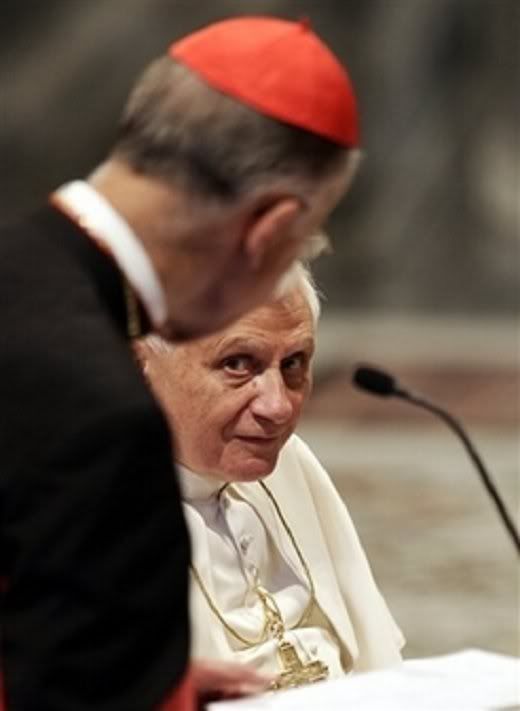
On the basic theme of this year's convention, the Pope said: "Jesus Christ resurrected from the dead is truly the indefectible foundation of our faith and our hope: he has been since the time of the apostles, who were direct witnesses of the Resurrection and who proclaimed it, he is today, and he always will be."
He reiterated what he said during the National Covnetnion of the Italian Church in Verona in October 2006: "The Resurrection of Christ is a fact, an event in history, of which the apostles wre witnesses, not its 'creators'. It was not a simple retuern to earthly life, but it was the greatest mutation that has ever happened in history, a decisive leap towards a dimension of life that is profoundly new, the entry into a different order that concerns not just Jesus but also us - the whole human family, history and the entire universe."
Only in the light of this hope, said the Holy Fahter, "can we comprehend the true dimension of Christian faith, as hope which supports and transforms us, liberating us from mistakes and false alternatives which restrict and weaken hope."
Christian hope, he reiterated, as he pointed out in Spe salvi, is not just personal but "comunitarian, for the Church and the entire "human family".
Hope for others is essential, he said, "because only then is it also hope for oneself."
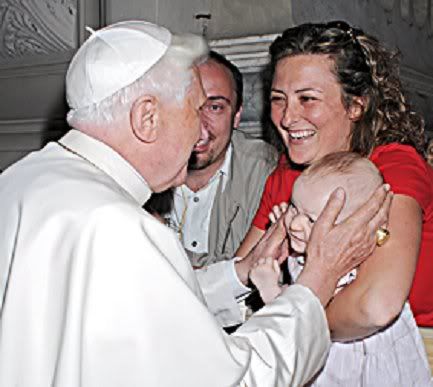
[Modificato da TERESA BENEDETTA 10/06/2008 23:22] |
 10/06/2008 05:44 10/06/2008 05:44 |
|
| | | OFFLINE | | Post: 13.838 | Registrato il: 28/08/2005
| Utente Gold | |
|
  PASTORAL VISIT TO LEUCA AND BRINDISI, June 14-15, 2008
PASTORAL VISIT TO LEUCA AND BRINDISI, June 14-15, 2008
   The Holy Father's next pastoral trip in Italy takes him to the southern extreme
of the Italian peninsula, the 'heel of the boot'- the southeastern coastal region
of Puglia.
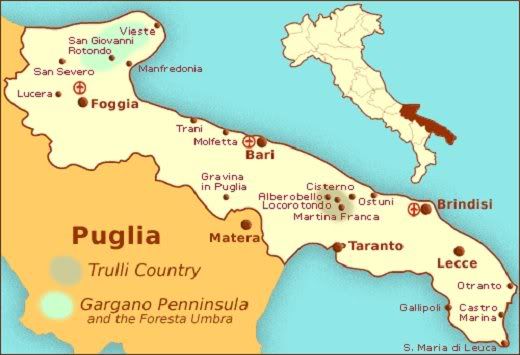
Santa Maria di Leuca (bottom of the map above) is part of the port city of
Castrignano del Capo, while Brindisi is a famous port town on the Adriatic,
and the starting point for ferries to Greece. It was the southern terminal
of the ancient Appian Way.
PASTORAL VISIT OF
HIS HOLINESS, BENEDICT XVI,
TO SANTA MARIA DI LEUCA AND BRINDISI
June 14-15, 2008
P R O G R A M
VISIT TO SANTA MARIA DI LEUCA
Saturday, June 14, 2008
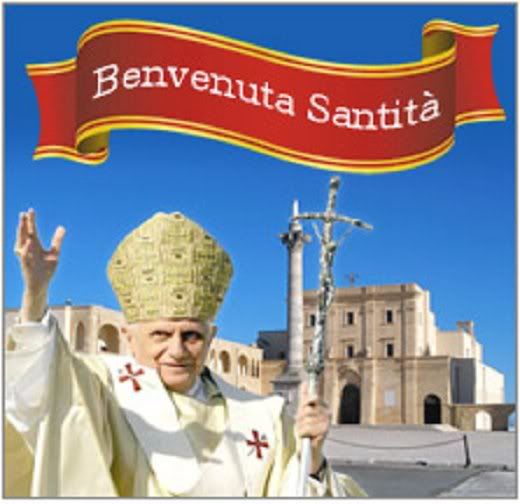
ROME
15.00 Depart the Vatican for Ciampino airport.
GALATINA-LEUCA
15.30 Depart Ciampino for Galatina
16.30 Arrival at Fortunato Cesari military airport in Galatina
- Transfer to helicopter for Leuca
16.50 Arrival at Leuca-Punta Ristola -
- Welcome by Mons. Vito de Grisantis, Bishop of Ugento; a representative of the Italian government;
Antonio Zanardi Landi, Italian ambassador to the Holy See; Puglia regional President Nichi Vendola;
Prefect Gianfranco Casilli of Lecce province; President of Lecce province, Giovanni Pellegrino;
the Mayor of Castrignano del Capo, Antonio Ferraro; and the Apostolic Nuncio in Italy, Mons. Giuseppe Bertello.
The Papal motorcade proceeds to the Basilica of Santa Maria di Leuca, along the Cristoforo Colombo
seaside boulevard passing by the tourist port.
17.15 Arrival at the Basilica Sanctuary of Santa Maria di Leuca.
- Prayer by the Holy Father
- Preparation for Holy Mass
17.30 Start of the Eucharistic celebration
- Greeting by Mons. Grisantis, Bishop of Ugento-Santa Maria di Leuca
- HOMILY BY THE HOLY FATHER.
19.15 Depart for Punta Ristola
19.30 Helicopter leaves for Brindisi
VISIT TO BRINDISI
June 14-15, 2008
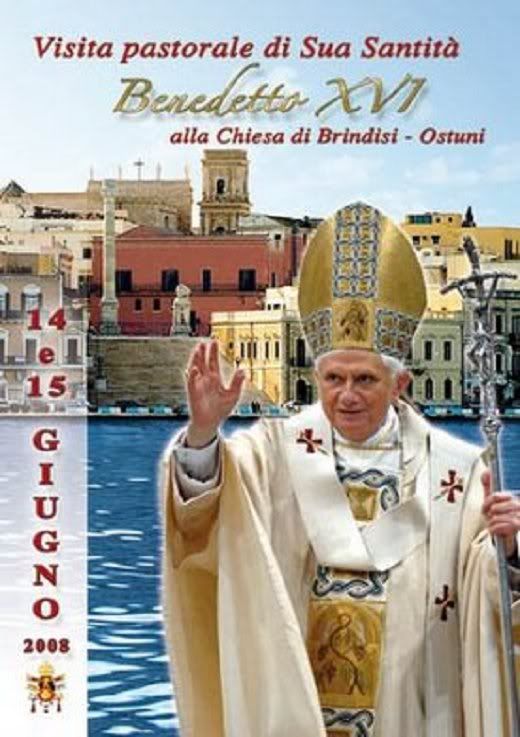 Saturday, June 14
Saturday, June 14
20.00 Arrival at heliport in via Spalato.
- Welcome by Mons. Rocco Talucci, Archbishop of Brindisi-Ostuni; a representative of the Italian government;
Ambassador Landi; Puglia President Nichi Vendola; Dr. Mario Tafaro, Prefect of Brindisi; Domenico Mennitti,
Mayor of Brindisi; and Dr. Michele Errico, President of Brindisi province.
- The civilian authorities will then precede the papal motorcade to go towards the city center.
- The Holy Father will transfer to a Popemobile to proceed to Piazale Flacco.
20.30 PIAZZALE LENIO FLACCO
- Festive welcome by the youth of the city
- Welcome and encounter with the city faithful.
- Addresses by the Italian government representative and the mayor
- GREETING BY THE HOLY FATHER
21.15 The Holy Father then proceeds to the Bishop's Palace where he will spend the night.
Sunday, June 15
09:15 The Holy Father will meet cloistered nuns in the chapel of the Bishops Palace.
09:30 Leave the Bishop's Palace in the Popemobile for Sant'Apollinare in Brindisi port.
10:00 Eucharistic celebration in Santi'Apollinare.
- HOMILY BY THE HOLY FATHER
12:00 The Holy Father will lead the Angelus.
- REMARKS BY THE HOLY FATEHR.
He then returns to the Bishop's palace.
13:00 Lunch with the bishops of Puglia, followed by a brief rest.
16:30 Greeting to members of the Organizing Committees at the Bishop's palace.
16:45 Visit to the Cathedral of Brindisi
- Adoration of the Blessed Sacrament
- Meeting with the priests and seminarians of the diocese.
- ADDRESS BY THE HOLY FATHER.
17:15 Travel by Popemobile to Brindisi-Casale airport.
17:45 Depart for Rome.
ROME
18:45 Arrival at Rome-Ciampino airport.
Travel by helicopter to the Vatican.
The Diocese of Ugento, to which Santa Maria di Leuca belongs, has a YouTube preview of the Pope's itinerary.
www.youtube.com/watch?v=SXwdpl2g9Hk&eurl=http://www.diocesiugento.org/leuca/i...
[Modificato da TERESA BENEDETTA 11/06/2008 04:11] |
 10/06/2008 15:05 10/06/2008 15:05 |
|
| | | OFFLINE | | Post: 13.878 | Registrato il: 28/08/2005
| Utente Gold | |
|
Benedict XVI urges Polish youth
to walk in truth

LEDNICA, Poland, JUNE 10, 2008 (Zenit.org).- Benedict XVI is encouraging Polish youth to form a friendship with Christ, though he acknowledges that friendship is a bond that requires effort.
The Pope made this invitation in a video message delivered Saturday to 70,000 young people gathered in Lednica for Poland's 12th Youth Day.
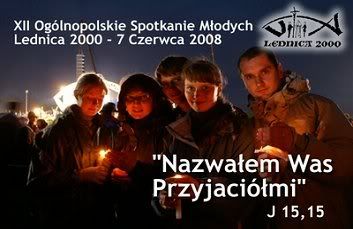 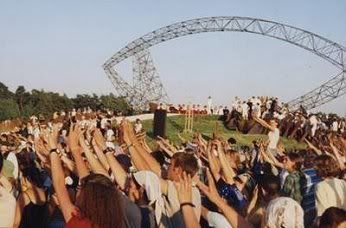
This year, the theme of the meeting was friendship.
The founder or the youth meeting, Dominican Father Jan Gora, said the theme of friendship is like a medicine: "It is 'a medicine' for the void of the contemporary world and for relationships lacking commitment.
"Friendship is the most beautiful gift that we can be given in life; therefore, it must be nurtured with care: at home, in school, at work, in marriage, but above all friendship with Christ must grow."
The vigil was attended by young people from all over Poland, but also from Ukraine, Byelorussia, Germany and England.
Coadjutor Archbishop Mieczyslaw Mokrzycki of Lviv, former personal secretary of Pope Paul II, was also present. He carried to Lednica's esplanade the cross that the late Pontiff used during his last public Way of the Cross.
The youth participated in a Mass celebrated by Archbishop Kazimierz Nycz of Warsaw. Then, they listened to the words of the Holy Father, who -- as in previous years -- delivered his address in Polish:
Dearest young friends, Jesus says to us: 'No longer do I call you servants (...) but I have called you friends' and added: 'for all that I have heard from my Father I have made known to you.'
Yes, friendship is an exacting bond: It is based on sincerity and testimony. If you wish to become friends of Christ and of men, go before him and before them in truth and give witness of your faith, hope and love. I greet you cordially and bless you, in the name of the Father, of the Son and of the Holy Spirit.
The next meeting in Lednica will be held in June 2009.
Holocaust survivors to thank Pope;
foundation aims to shine light
on historical facts

NEW YORK, JUNE 9, 2008 (Zenit.org).- A New York-based organization will bring a group of Jewish Holocaust survivors to visit Benedict XVI next week. They want to personally thank the Pope for the Church's intervention in saving their lives during the war.
The Pave the Way foundation is bringing the group to visit the German Pontiff on June 18. It is just one initiative the foundation has undertaken to clear up misunderstandings about the Church and its role during the Holocaust.
Another initiative is a September symposium on the papacy of Pope Pius XII.
The Pave the Way foundation partnered with TV News Agency Rome Reports to videotape eyewitness testimony. They uncovered secret activities of the Pope and members of the papal household to save the lives of Jews during the war.
The foundation consulted various experts who will be panelists at the symposium. The audience will be over 100 mostly Jewish religious, educational and community leaders from around the world.
The participants will be presented with historical newspaper accounts, documents and eye witness testimony from those who are still alive.
The purpose of the symposium will be to analyze what is known to date, while Vatican archivists continue to prepare thousands of documents to be opened.
The foundation clarified that the symposium does not aim to give a scholarly review of archived manuscripts.
"This event will be almost like a jury, where events of the day and actual witnesses can help the group reach a reasonable conclusion today, which will be subject to historical confirmation when the archives have been opened," a statement from the foundation explained.
The symposium participants will also get a chance to visit Benedict XVI.
=====================================================================
US Catholic students complete
2 million service hours
in Pope's honor

WASHINGTON, June 9 (CNS) -- More than 2 million community service hours have been completed by U.S. Catholic school students and youths in honor of Pope Benedict XVI's 81st birthday.
The campaign, "Birthday Blessings for Pope Benedict XVI: A Gift of Public Service from U.S. Catholic Youth and Students," concluded May 31.
It was launched in February by the National Catholic Educational Association as a way to mark the first visit of Pope Benedict to the United States. He turned 81 April 16, the first full day of his April 15-20 visit to Washington and New York.
Students from Catholic elementary and high schools, parishes, colleges and seminaries participated in the campaign.
Karen Ristau, NCEA president, described the youths' participation as "both overwhelming and gratifying."
"Initially we aimed for 709,560 service hours," she said, to "equate to one hour of service for each hour of the pope's life. Then we aimed for 1 million hours. Two million hours is just amazing."
[Modificato da TERESA BENEDETTA 11/06/2008 03:00] |
 11/06/2008 02:06 11/06/2008 02:06 |
|
| | | OFFLINE | | Post: 13.888 | Registrato il: 28/08/2005
| Utente Gold | |
|
    The Vatican continues its play-up of the Friday audience between the Pope and President Bush, with this lengthy interview coming out in tomorrow's (6/11) issue of L'Osservatore Romano. The two photos used here are those used by the OR to illustrate the article
The Vatican continues its play-up of the Friday audience between the Pope and President Bush, with this lengthy interview coming out in tomorrow's (6/11) issue of L'Osservatore Romano. The two photos used here are those used by the OR to illustrate the article.
INTERVIEW WITH MONS. SAMBI:
Benedict XVI has given back courage
to the Catholic Church in America
by Gianluca Biccini
Translated from
the 6/11/08 issue of

"The image that Americans had of Benedict XVI has changed, as has the image of the Catholic Church, which has regained courage."
On the eve of a visit to the Vatican by President George W. Bush, the Apostolic Nuncio to the United States, Archbishop Pietro Sambi, draws a very positive balance of the Pope's apostolic visit on April 15-21.
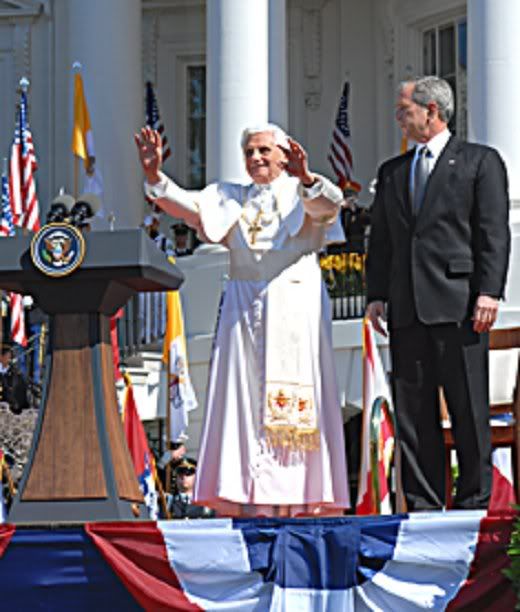
In this interview with our newspaper, he recalls the warm, familial and enthusiastic atmosphere with which Benedict XVI was welcomed on US soil, noting that Americans 'discovered' in the Pope 'an apostle of hope' - an expert in "what is happening within the heart of man today", "bearer of substantive and revitalizing answers, offered with clarity, with humility, almost shyly - as a passionate 'connoisseur' of Jesus Christ and servant of his Church".
For all this, Benedict XVI earned "the sympathy, the affection, the respect and the love of an entire people". It is a success, said Sambi, that is explained by the Pontiff's ability to penetrate the soul of American society and to bring it humbly the answers that it appears to need - above all, insofar as the religious dimension "which must not be relegated to the private sphere, but valued as the fundamental guarantee of human rights and obligations."
The papal representative to the United States also identified an underlying theme of the visit, beyond its motto of 'Christ our hope', which permeated all of the Pope's discourses in the United States: "the urgency of Catholic formation as a base for re-launching a new evangelization in the United States".
Benedict XVI, in speaking of his trip to America, has said many times that he Catholics of that country had 'confirmed him in hope'. This 'feeling' between the Pope and the American people - was it due to the emotion of the moment or does it have deeper roots, and if so, what are these roots?
To the Catholic radio station of the Archdiocese of New York, the Pope said: "I came to confirm you in the faith, but in fact, it is you who have confirmed me, with your response, your enthusiasm and your affection." These spontaneous words have reached the hearts of many and are perceived as words of appreciation and encouragement.
On Sunday, April 27, at the Regina caeli prayer, Benedict XVI thanked God that he had allowed him to be an instrument of hope in Christ for the Church in the United States and for its faithful: "At the same time, I thank God because I myself was confirmed in hope by the Catholics of America. Indeed, I found in them a great vitality and a decided will to live their faith and to bear witness to faith in Jesus."
The theme of hope established a deep relationship between the Pope and the faithful as being on the same spiritual wavelength.
In his homily at Nationals Stadium in Washington, the Pontiff said: "Americans have always been a people of hope... Hope in the future is a profound part of the American character. The Christian virtue of hope has also characterized, and continues to characterize, the life of the Catholic community in this nation."
On September 11, 2001, when the Twin Towers were attacked in New York and the Pentagon in Washington, the American people, as always in their difficult moments, turned to their churches and temples to find trust, unity and courage in God. This people have never been apart from the Word of God: the Bible remains the most widely owned book among American citizens. They have never been apart from prayer, which continues to mark the most significant moments of their private, family and national life. Thanksgiving Day is the most widely observed holiday in the United States, and there is hardly a citizen who does not observe it. Jesus Christ has never been simply an icon here, but a person, the last recourse for hope.
Speaking of hope, therefore, the Pope touched a subject that is deeply rooted in the history and culture of this people, and was able to touch a chord that is particularly sensitive these days.
On more than one occasion, the Pope has also described his visit to Washington and New York as 'a singular missionary experience'. Does the United States need a new evangelization at this time?
Yes, like all the nations in the world, the United States needs new evangelization today. It should start 'at home', that is, in the very heart of the Church itself, to make the Christian recover the gratitude, the joy and the strength of being Christian.
The Pope has opened the way with his addresses to bishops, priests, religious, teachers, the youth, the lay faithful - all the sectors of the Church are called on to carry out this mission, to be the instruments of the Holy Spirit for a new Pentecost.
Especially for Catholics who are a minority in the USA, four fundamental attitudes are necessary to have a positive influence on society. First, a clear Catholic identity: to know who one is and wants to be - otherwise, it is like being a drop of wine in a glassful of water. Second, a strong sense of belonging: everyone needs a community, and the community needs everyone - whoever walks alone ends up getting lost. Third, cultivating excellence in one's personal, familial and professional life, in order to be a lamp shining outside the bushel, the city on the hill.
Finally, enriched by a clear identity, a strong sense of belonging,
and the cultivation of excellence, the fourth attitude is full readiness to work with whoever wants to build a better future.
At Nationals Stadium in Washington, the Pope said: "The challenges which we face demand an ample and healthy instruction in the truth of the faith. But they also demand that we cultivate a way of thinking, an intellectual 'culture' which is genuinely Catholic, trusting in the profound harmony between faith and reason, and prepared to bring to bear the richness of the vision of the faith on the urgent problems for the future of American society."
He spoke about the urgency of Catholic formation on other occasions: I think this topic was the underlying message of all his interventions in the United States, as a basis for re-launching a new evangelization.
In the meeting with George W. Bush, both sides underscored the convergence of vision between the Pope and the President. And yet recent history shows that there have been evident differences in some areas such as the war in Iraq and the death penalty. What do you think about this?
The welcome that President Bush gave the Pope was altogether extraordinary. The conversation between the two was private. We know the part that they made public, but we cannot rule out that other topics were discussed.
In his reflections on his apostolic voyage to the United States, at the general audience of April 30, the Pope himself referred to a subject of great importance: "In the meeting with the President at his residence, I was able to pay homage to that great nation, which from its very beginning, was built on the basis of a happy conjugation between religious, ethical and political principles, which still constitutes a valid example of healthy secularity, in which the religious dimension, in the diversity of its expressions, is not only tolerated but valued as the 'spirit' of the nation and the fundamental guarantee for human rights and obligations."
Thus, the religious dimension as something not to be relegated to the private sphere, but upheld as the spirit of the nation.
Benedict XVI did not forget he was on the territory of a world superpower and indicated the mission of the local Church in such a context: "The Church can carry out with freedom and commitment its mission of evangelization and human promotion, and even as a 'critical conscience', contributing thereby to the construction of a society that is worthy of the human being and at the same time, stimulating a nation like the United States, which everyone looks to as one of the principal actors on the international scene, towards global solidarity, which is ever more necessary and urgent, and towards the patient exercise of dialog in international relations."
John Paul II reminded America in the past: "Lazarus [the beggar outside the rich man's door in the Gospel story] is seated beside your door." While the powerful may be tempted to impose themselves by force, he who wants to build the future will trust in patient dialog that does not subjugate but convinces.
The joint communique from the President and the Pope enumerated the subjects that they discussed, including peace and the situation of Christian communities in the Middle East, poverty and disease in Africa, Latin America and the problem of immigration.
The crowds at the Eucharistic celebrations, along the streets and at the Pope's meeting with the youth were unprecedented. [Unexpected perhaps, for Benedict 'the Unknown' in the United States, but hardly unprecedented, either for him or for John Paul II!] How does one explain this success?
Benedict XVI was little known in the United States, and the little that was 'known' about him was false. So those who were expecting 'the unbending gendarme of the Inquisition' were won over by the pastor, the father, the persuasive teacher.
They 'discovered' in the Pope an attentive expert of what is taking place in the hearts of man today; as the bearer of substantive and revitalizing answers, offered with clarity, with humility, almost shyly; as a passionate 'connoisseur' of Christ and servant of his Church; as an apostle of hope. Therefore, that explosion of sympathy, attention, respect, and affection from an entire people.
The ecumenical and inter-religious meetings created a personal connection between the Pope and other Christian denominations as well as other religions.
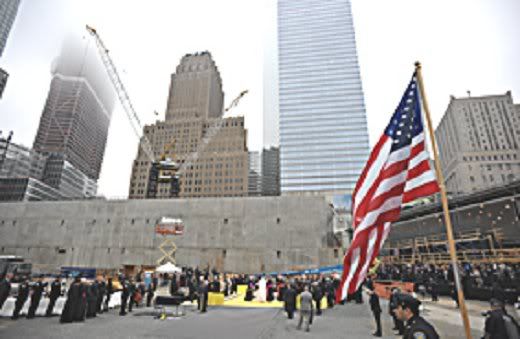
The visit to Ground Zero was a moment of intense identification by the American people, independent of faith, with Benedict XVI.
Even those elements of the the mass media, who usually do not hide their bitterness or hostility against the Church, wrote about or broadcast the Pope's activities with interest, respect and sympathy.
The expressions most commonly heard [about the visit] were, among Catholics, "a pastoral visit full of blessings for the whole Church and the nation"; and in the secular world, "A success beyond all expectations."
Given the power and worldwide resonance of the US mass media, a success here means a success worldwide.
In the Pope's meeting with the youth in New York, everyone could see the joy on the part of Benedict XVI as well as on the part of the young people. When he told them, "I promise to remember you every day in my prayers", they burst out spontaneously, crying out, "We love you!"
His address to them will remain for many a guide to finding sense in youth and their mission in life. I asked a young seminarian what he experienced during the Pope's visit, and he said, "I have concluded that it is exalting and gratifying to be a priest today."
The Pope's success may be explained by the ability of Benedict XVI to understand the American spirit, and to bring Americans, with humility, the answers that they need.
The Pope has spoken of the United States as 'a secular nation out of love for religion'. Do you think it could be a model for other Western societies that are in the grip of the problem of secularization?
The Pope spoke of the United States as 'a valid example of healthy secularity' and he described what this entails: "Where the religious dimension, in the diversity of its expressions, is not only tolerated, but is prized as the 'spirit' of the nation and the fundamental guarantee of human rights and obligations". It is a description of 'healthy secularity' which should be studied attentively.
Each nation has its own history of the relationship between faith and reason, between religion and nation. But the values of a 'healthy secularity' as the Pope described it are a wealth for everyone.
Have the repeated and explicit interventions of the Pope on the scandal of sexual abuses committed by some priests definitely closed the issue or are there still open questions?
The Pope addressed the problem repeatedly: to the American bishops, to priests, and to the faithful. And in an emotion-filled meeting, he also spoke to some victims. There had been apprehension in the United States that 'the Vatican' had not understood the gravity of the phenomenon. This idea disappeared after the Pope's interventions, which were inspired by truth and mercy. He has shown the way to overcome these humiliating circumstances. But vigilance will always be necessary.
After the Pope left, what remained in the mass media in the succeeding days?
After he left, there were opinion surveys made. The positive rebound was impressive and unusual in the United States. The Americans had changed their image of Benedict XVI, and even of the Church in the United States, which has drawn new courage from the visit.
Parishes have reported that many faithful, who had long abandoned religious observance, have started coming back to Mass and even to confession.
After the news reports, newspapers and magazines came out with analyses, generally very positive, of the whole visit. The diocesan publications were full of photographs and accounts by the faithful as well as the addresses of the Holy Father. But mostly, the visit is kept alive by word of mouth among the faithful.
The American Church is aware of all this and wishes to continue along the road opened up by the Pope "to make everything new again in Christ, our hope".
|
 11/06/2008 15:59 11/06/2008 15:59 |
|
| | | OFFLINE | | Post: 13.894 | Registrato il: 28/08/2005
| Utente Gold | |
|
GENERAL AUDIENCE TODAY
A full translation of the catechesis has been posted in AUDIENCE & ANGELUS TEXTS.
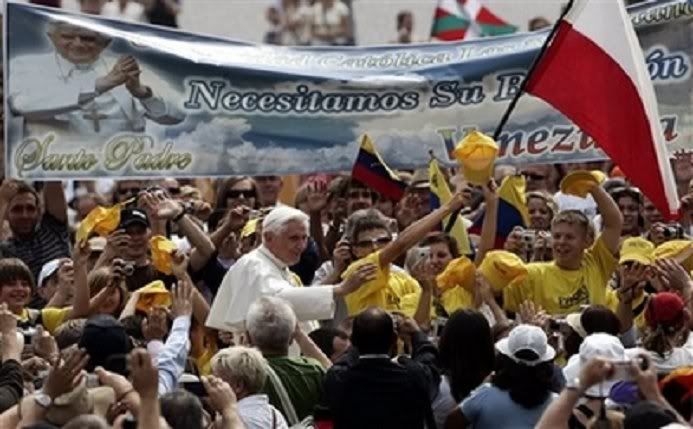
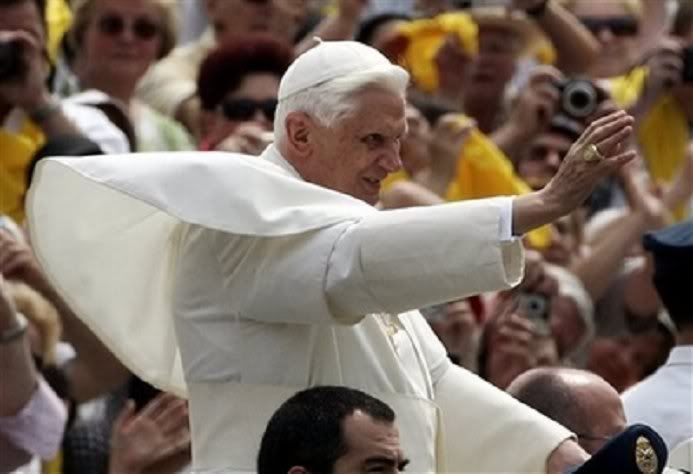
The Holy Father today turned to St. Columban, an early medieval Irish monk, as the subject of his catechesis at today's general audience held in St. Peter's Square. Here is how he synthesized the catechesis in English:
In today’s catechesis we turn to Saint Columban, one of the many Irish monks who contributed to the re-evangelization of Europe in the early Middle Ages.
Columban made his monastic profession in Bangor and was ordained a priest. At the age of fifty, he left the monastery to begin missionary work in Europe, where entire regions had lapsed into paganism.
Beginning in Brittany, Columban and his companions established monasteries at Annegray and Luxeuil. These became centres for the spread of the monastic and missionary ideals brought by the monks from their native Ireland.
Columban introduced to Europe the Irish penitential discipline, including private confession. His stern moral teachings led to conflict with the local Bishops and the Frankish court, resulting in the exile of the Irish monks, first to the Rhineland and then to Italy.
At Bobbio, where he established a great monastic centre, Columban worked for the conversion of the Arian Lombards and the restoration of unity with the Bishop of Rome.
It was there that he died, leaving behind not only the example of an austere monastic life, but also a corpus of writings which shaped the monastic culture of the Middle Ages and thus nourished the Christian roots of Europe.
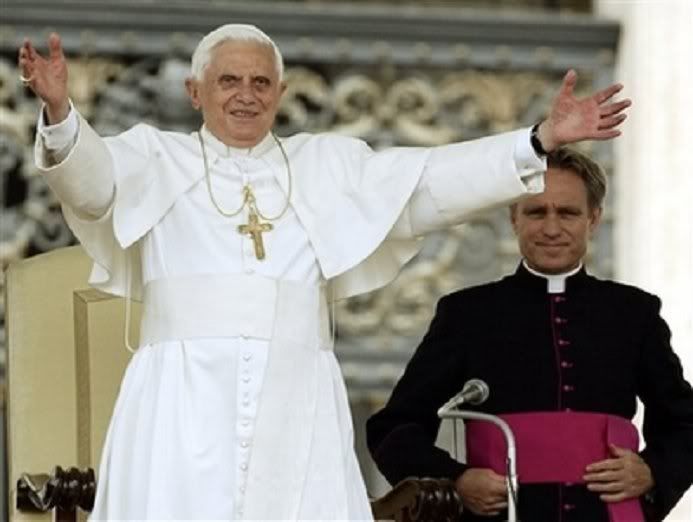
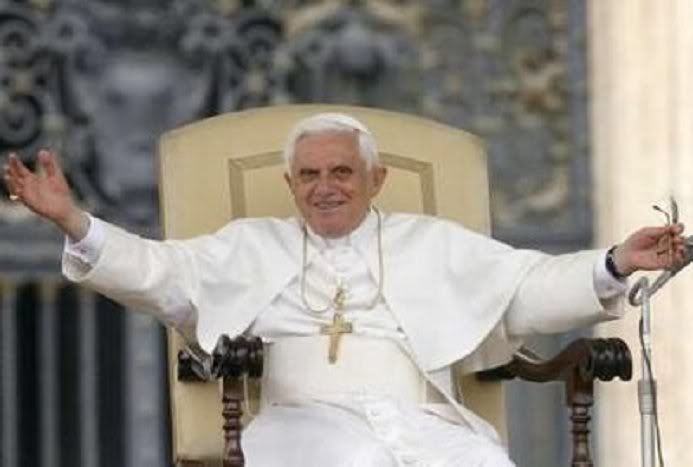
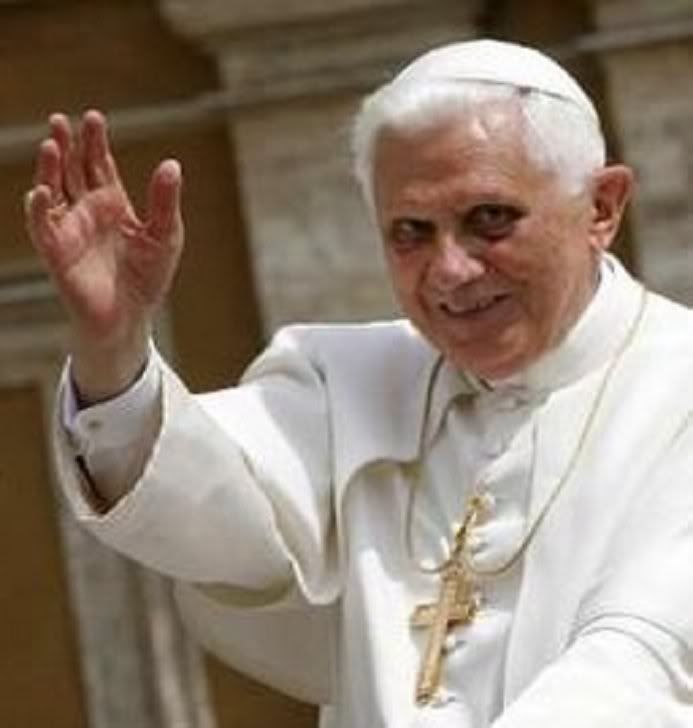
=====================================================================
POPE MEETS SAUDI DELEGATES
TO INTER-RELIGIOUS MEETING
WITH PONTIFICAL CIRD

VATICAN CITY, June 11 (Translated from Apcom) - After the General Audience at St. Peter's Square today, the Pope met with the participants of a meeting of the Muslim-Catholic liaison committee established by the Pontifical Council for Inter-Religious Dialog and the International International Islamic Forum for Dialog based in Jeddah, Saudi Arabia.
Present at the meeting, held at a small salon off the Aula Paolo VI, were CIRD president Cardinal jean Louis Tauran and the secretary of the Council, Mons. Pier Luigi Celata.
The committee meets Wednesday to Friday on the theme, "Christians and Muslims as witnesses for the God of justice, peace and compassion in a world of violence".
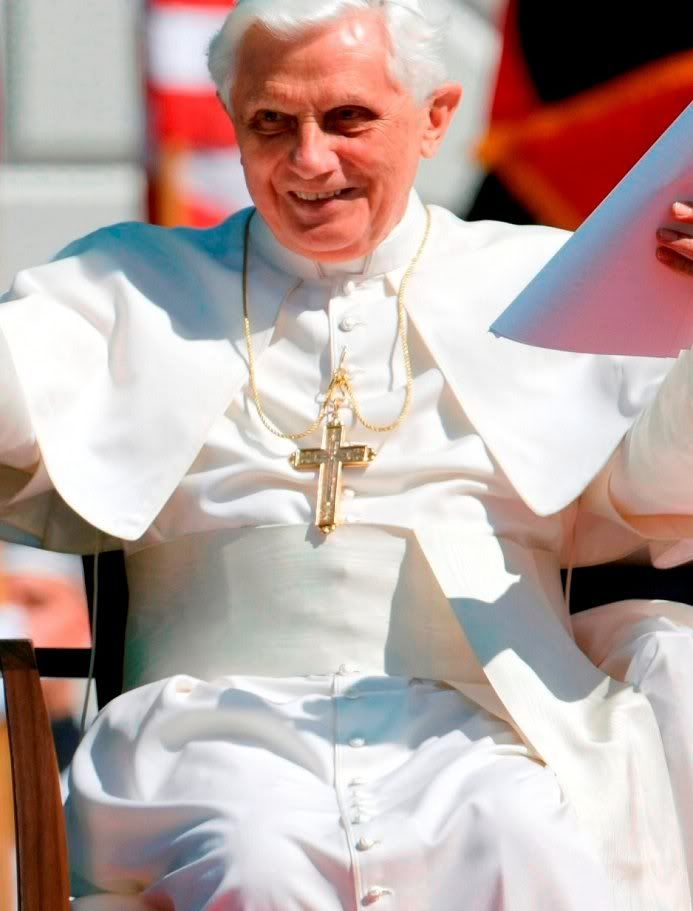 A videocap from today's GA, thanks to Monica/Pandora!
A videocap from today's GA, thanks to Monica/Pandora!
The colorful flags at St. Peter's Square today belong to a historical re-enactment group which paid homage to the Holy Father, in full medieval regalia and medieval isntruments:
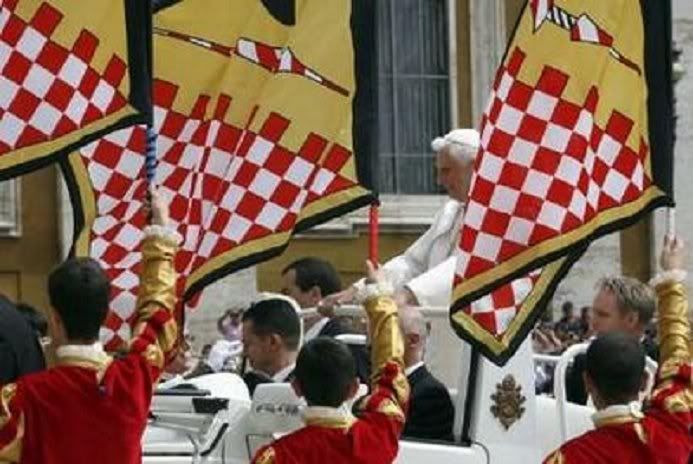
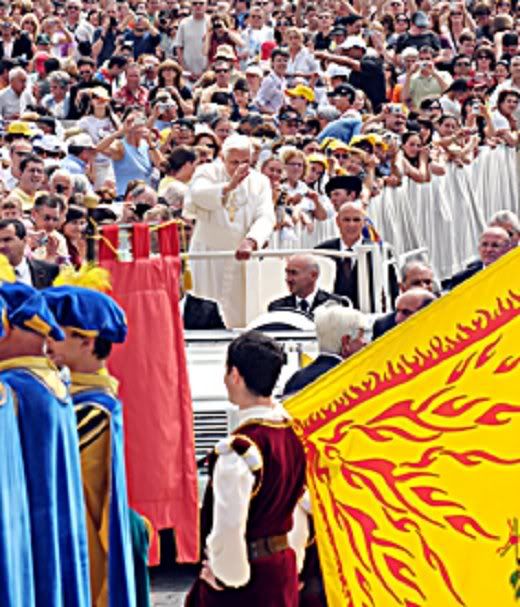
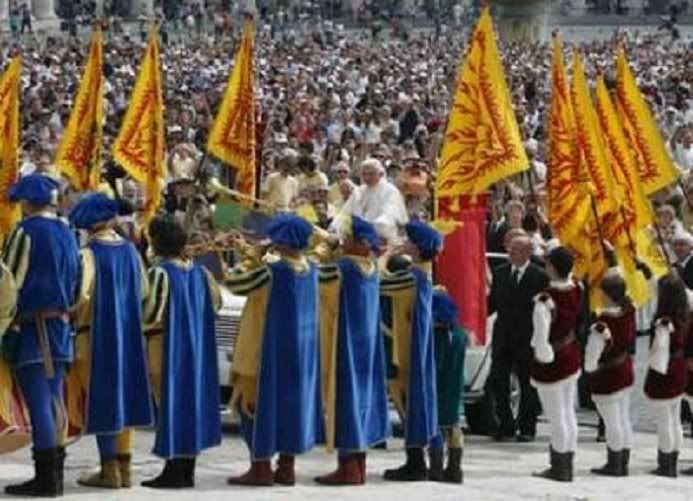
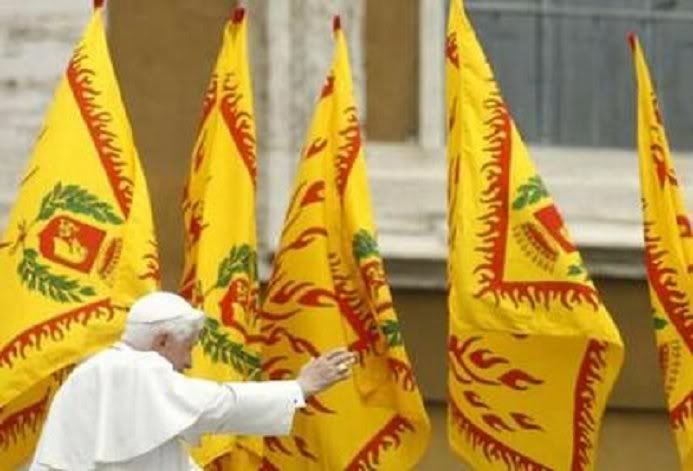
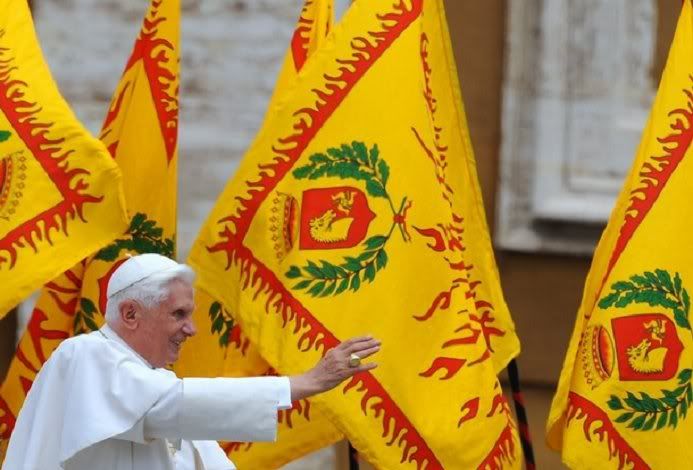
[Modificato da TERESA BENEDETTA 13/06/2008 01:07] |
 12/06/2008 14:51 12/06/2008 14:51 |
|
| | | OFFLINE | | Post: 13.899 | Registrato il: 28/08/2005
| Utente Gold | |
|
   
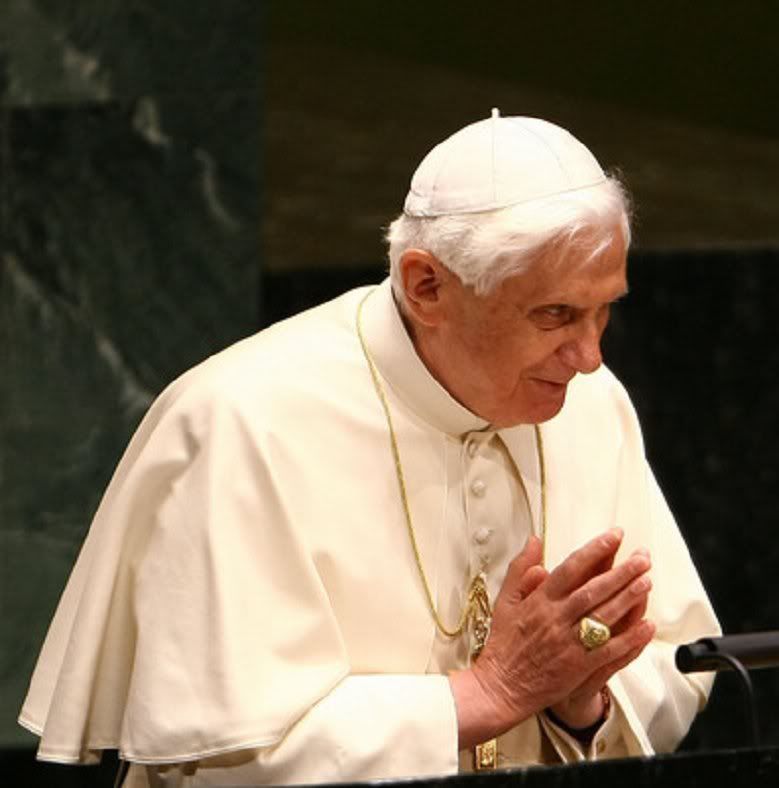 In the run-up to the Benedict-Bush meeting Friday at the Vatican, L'Osservatore Romano in its 6/12/08 issue continues playing up the US President's current European trip (his last as President), with a picture yet, showing Bush with German Chancellor Merkel in a casual photo, as well as a two-months-after review of the Pope's US/UN trip.
In the run-up to the Benedict-Bush meeting Friday at the Vatican, L'Osservatore Romano in its 6/12/08 issue continues playing up the US President's current European trip (his last as President), with a picture yet, showing Bush with German Chancellor Merkel in a casual photo, as well as a two-months-after review of the Pope's US/UN trip.
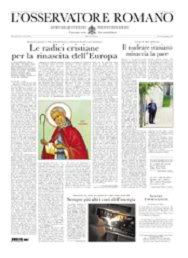 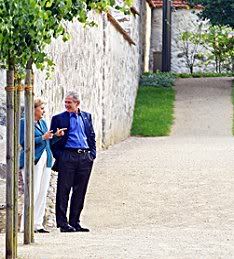 Note the above-the-fold, right-hand placement of the Bush story for the second time this week, with the headline 'President Bush to Europe: 'Iran's nuclear program is a threat to peace'.
Note the above-the-fold, right-hand placement of the Bush story for the second time this week, with the headline 'President Bush to Europe: 'Iran's nuclear program is a threat to peace'.
Looking back on the Pope's trip, it is the turn this time of the Vatican's permanent observer to the United Nations, Mons. Celestino Migliore, who also hosted the Holy Father during his three days in New York City.
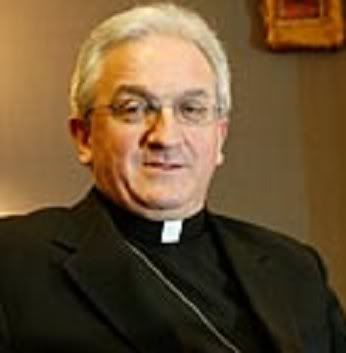 The visit to the USA and the UN:
The visit to the USA and the UN:
Looking back two months after
INTERVIEW WITH ARCHBISHOP MIGLIORE
By Andrea Monda
Translated from
the 6/12/08 issue of

By temperament and by virtue of his position, Archbishop Celestino Migliore, 55, permanent observer of the Holy See to tHE Untied Nations in New York, is not the loquacious type.
Though very affable, Migliore is ever 'diplomatic'. This time, however, he was all too willing to speak about the joy which is still very vivid for him two months since the visit of Benedict XVI to 'his home' in New York, having been the Holy Father's host in thE Big Apple.
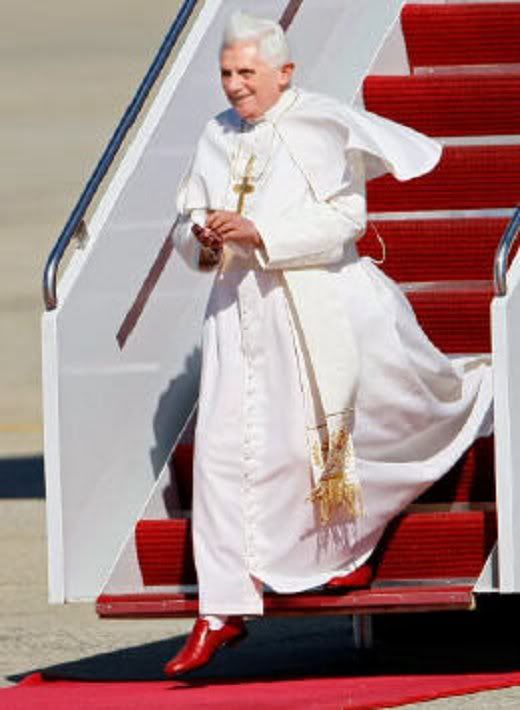
The affection between the Pontiff and the American people, Mons. Migliore, points out, took hold from the first moment: "When the Pope stepped off the plane at Andrews Air Force Base, I think the American public immediately were taken in by his great humanity. They were looking forward to assessing the Pope firsthand, his spiritual, intellectual and human qualities. At that moment, what they saw was a Pope who was happy to have arrived in the United States, who was very much at ease, and was apparently anxious to meet the American public. His arrival and everything that followed was all celebration, warmth and reciprocal understanding."
The reciprocal sympathy that sprung up that first day in Washington, in Mons. Migliore's view, found its crowning moment during the Pope's visit to Ground Zero:
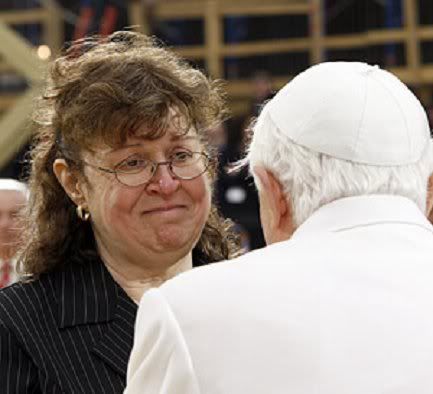
"I must say that the profound empathy of the Pope at what remains to be the most burning symbol for an entire nation - in a ceremony that was almost wordless, but a heart-to-heart communication - made Americans feel he was one of them. At the same time, they saw the great authority with which he presented his message.
"It was on the same wavelength that his two unscheduled appearances outside the residence in New York took place. The first was to meet hundreds of people who had assembled to wish him 'Happy birthday', and the second time, to greet some 50 patients from a pediatric hospital.
"The Pope's affection and his sense of dignity showed him to Americans in all his moral authority which is also able to give hope and a sense to life."
It was not just the Pope's success with crowds, Migliore notes, but also the extraordinary media successof the visit. He is aware that there is a risk in emphasizing the event, of transforming the person into a personage and thus missing the profound sense of the entire trip.
"That's an inherent risk, and not only with the media," he said. "But whoever followed the various stages of the Pope's visit would also have seen that the applause and the ovations did not interfere with listening and communication. I am thinking, for instance, of the intimate joy that was evident among the priests and religious at St. Patrick's Cathedral.
"Another thing: I know that many young people, the day after he met them in Yonkers, wrote him to say they were entrusting their future to God. And I have received so many significant testimonies at the United Nations, both from diplomats and from the staff."
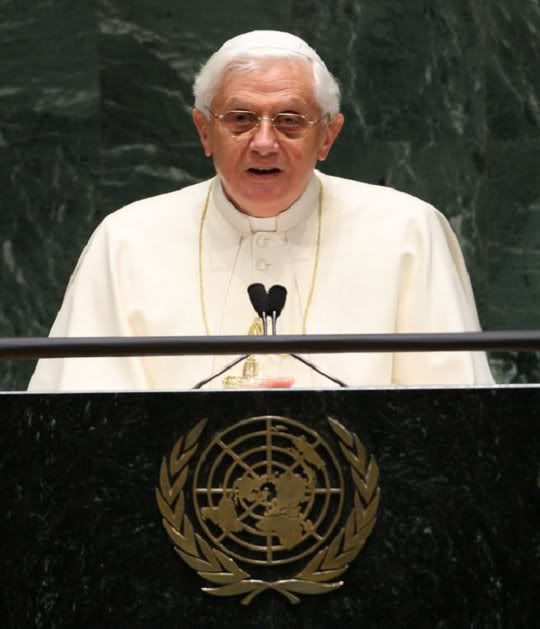
Mons. Migliore thinks that the visit to the United Nations has historic weight. "That Pope Benedict did not come to say ceremonial words, everyone expected. For weeks, I was besieged by reporters wanting to know what the Pope would say. It didn't bother me - it was a sign that the words of the Pope still count a lot today, and that he was awaited at the UN not as a head of state but as a moral authority. Am authority who conserves the principles and the basic values of life for individuals as well as for society. A moral authority based on acknowledgment of 'natural law' which precedes man-made laws and cannot be contradicted by them.
"That is how the Pope goes to the root of every problem: the rights of man - based on natural law inscribed in the heart of everyone, and present in different cultures and civilizations - and the equal dignity of every human being."
In the United Nations, the Holy See has chosen to be an observer, rather than a full-fledged member. "The Holy See thereby," Mons. Migliore explains, "contributes to the debate on the big questions and does so by drawing on the Church's patrimony of social doctrine. And we are able to follow closely the negotiations that take place about these issues."
Why, we asked, is it important to take part in negotiations on the documents that the UN adopts?
"Because anything in them that is juridically binding becomes international norm. Texts with political significance create so-called 'soft law', and the tendency of every parliament on earth is to legislate with an eye to such norms," the archbishop said.
"Finally, there is another aspect: to give a voice to those who do not have a voice. How many times have representatives of Catholic communities from around the world write or tell the Pope personally about their problems which seem to have no end or no solution! So at time, we have to speak in their name, or to help them find the agencies that can do something for them."
Among the most urgent issues touched by the Pope in his UN speech was religious freedom. "In fact," Mons. Migliore notes, "despite all the beautiful st6atements made about it, religious freedom remains, in many part of the world, the Cinderella of human rights. During his visit, the Pope came back to this theme, speaking of the United States as 'a secular state out of love for religion' to be lived freely in all authenticity.
"There are some indispensable elements which make respect for and promotion of religious freedom as the key for a government and society which respect all fundamental human rights. Religion should not be considered a problem, but part of the solution. The American pioneers escaped situations of religious oppression in Europe and held firm and precious the idea of the relationship between God and society. Religion is authentic when it is not manipulated for other ends. And this can only happen if it is lived freely -when governments, civilian societies including religious communities, are all convinced that religious freedom grafted to the dignity of every human being."
Then there are the 'ethically sensitive' issues, those related to bioethics or the demographic question. What is the present situation? Was the Pope's visit of help in this sense? Has it created problems or has it made a new approach possible?
"The Pope," said Mons. Migliore, "had a felicitous statement in this respect, because he summarized a secular diatribe in two words that offered a way. He said it is never a question of choosing exclusively between science and ethics, but of adopting scientific methods that are fully respectful of ethical imperatives." America is the nation of freedom but also of searching for the truth.
In his homily at Yankee Stadium, Mons. Migliore noted, "the Pope spoke of 'immutable' truths which make men free and which "can guarantee respect for the dignity and rights of every man, woman or child in this world, including babies who are still in their mother's womb." These are hot issues, not only in Italy and the us, but ":also and above all, at the UN," the archbishop concludes.
'It is the result of the political will of individual member countries, about which it has been evident for some time that compromise and negotiation on just abut anything has been substituted for welcome and respect for certain on-negotiable principles. Benedict XVI's insistence that the conviction by the authors of the Universal Declaration of Human Rights that the rights of man with respect to certain principles, such as the defense of life, are not subject to the will of the majority or of governments, should guide us in all the debates and resolutions as we mark the 60th anniversary of that document."
[Modificato da TERESA BENEDETTA 13/06/2008 01:04] |
 12/06/2008 16:04 12/06/2008 16:04 |
|
| | | OFFLINE | | Post: 13.902 | Registrato il: 28/08/2005
| Utente Gold | |
|
  A well-rounded Pope:
A well-rounded Pope:
Benedict XVI's qualities
and fundamental ideas
By Gisèle Plantec

ROME, JUNE 11, 2008 (Zenit.org).- Benedict XVI is impressive in his well-rounded character -- a man who goes easily from playing the piano to visiting world leaders to explaining to children the mystery of the Eucharist, affirmed a scholar from a Roman university.
Legionary of Christ Father Juan Pablo Ledesma talked with ZENIT about the German Pope -- his most striking qualities and the ideas that presumably govern his thought.
ZENIT approached Father Ledesma, dean of theology at the Regina Apostolorum university, following a conference he helped to organize last month on "The Voice of the Christian Faith: 'Introduction to Christianity,' by Joseph Ratzinger/Benedict XVI - 40 Years Later."
How do you think Benedict XVI's theology was born?
Suffice it to recall his formation. Following his priestly ordination, he began to work as vicar in a parish, where his intellectual gifts became evident. He earned a doctorate in theology in 1954, with a thesis on the concept of the Church as house and people of God in the thought of St. Augustine.
Later on, he completed his degree with another thesis, on St. Bonaventure, reflecting his extensive culture and profound theological understanding drawn from patristic and medieval sources. He taught in several universities, including Munich and Tubingen. In 1961 he was appointed to the chair of fundamental theology and, three years later, took part as a theological expert in the Second Vatican Council.
What are Benedict XVI's qualities that you most admire?
There are so many -- perhaps what impresses me most is his simplicity and depth. I am ever more fascinated by his first words as Pope: "laborer in the vineyard of the Lord ... an ineffective instrument."
These words evoke the Rule of St. Benedict, the sixth degree of humility, that in which the monk is happy with the poorest and most ordinary things, and considers himself a useless and unworthy laborer in regard to all that obedience imposes on him.
I am also impressed by the profound, simple and spontaneous expressions of his very personal love for Jesus Christ. It is a love that is manifested in his words and gestures and, above all, in his way of celebrating the Eucharist. Everything, in his person and ministry, is centered on Jesus Christ.
I am also attracted by the way the Pope greets each person. He pauses, without hurry, knows how to listen, encourage and smile. It is easy to see Christ's goodness in his look and in his way of accepting his neighbor.
I am impressed to see the Pope playing the piano, greeting the greats of the world or explaining to children how Jesus is present in the Eucharist, using the example of electricity or a microphone, to show how invisible things are the most profound and important.
In a few words, what are the most important ideas that govern Joseph Ratzinger's thought?
That is a difficult and risky question. I believe it might be the concept of faith. For him, faith needs a "you" to sustain it. It needs a you who knows us and loves us, so that we can trust and confide in him as a "child nursing in its mother's arms." Thus, faith, trust and love conform a unique whole, an identical, indestructible reality. For Pope Benedict, this faith is a lived faith.
I very much like his interpretation of the word Amen, which is not only the response of faith to the Creed of the Church. To pronounce Amen means faith, trust, abandonment, fidelity and love. Amen is not a particle that ends all prayers, but the total adherence of the person who prays, who believes, who loves revealed Love -- logos-veritas -- as love incarnate.
Amen, in sum, is the total and radical answer to the whole symbol-creed: all or nothing. There are no alternatives, pretexts or half measures. Just as the person is a totality, the response of faith and love must be total: Amen is synonymous with "all."
I believe that truth is also the crucial point in the mind and teaching of Joseph Ratzinger. For him, the greatest problem that exists and that the man of today faces is the lack of truth: relativism, the negation of truth.
Do you see some relationship between Introduction to Christianity and the two last encyclicals?
Both in Deus Caritas Est as well as in Spe Salvi, we find the same pastor, thinker and theologian who makes concepts accessible.
Forty years ago, Professor Ratzinger himself said: "Love generates immortality, and immortality proceeds only from love. [...] If He has resurrected, we will also resurrect, because love is stronger than death. [...] Either love is stronger than death or it isn't."
Therefore, if love is true love, it must need infinitude, indestructibility. This reflection seems important to me because it is the basis of everything and the key to understand the eschatology that Pope Benedict XVI offers us in his Spe Salvi.
However, is there not a way in which love and judgment seem to be a contradiction?
On the contrary. Love, if it is true love, calls for judgment because it is also just. A love that judges is necessary, because the injustice of the world cannot have the last word. It would be unjust. A love that destroyed justice would be unjust, it would not be love.
Beyond the day of rendering accounts, fearful and menacing, the Christian knows that his judge will be Truth, Trinity, Love, a person who, being man, is also our brother: Jesus Christ.
In face of judgment, these words written 40 years ago console us and give us hope: "Man cannot disappear totally, because he is known and loved by God. If all love longs for eternity, love of God not only yearns for it, but realizes and personifies it" [Introduction to Christianity].
What more personal and less academic aspect of Benedict XVI's personality would you highlight?
I especially like the legend of St. Corbinian's bear, motive of Pope Benedict's motto. It is an ancient legend. The holy founder of the Diocese of Freising, the monk Corbinian, was on his way to Rome. He took with him a beast of burden. A bear attacked and killed the animal. The saint reprimanded it and ordered it to take the baggage in the animal's stead. In this way, they both arrived in Rome.
Cardinal Ratzinger applied this to himself, making use of the words of St. Augustine when commenting on Psalm 72:22: "I have become a beast of burden, and, precisely because of this, I am with you." God makes use of him, uses him, burdens him, but precisely because of this, God is close to him.
What is Benedict XVI's message for this world, for today?
Every Wednesday [and every Sunday at Angelus] we hear his word as universal pastor of the Church, and in so many homilies, addresses, messages. It is always the same message, with particular accents.
I very much like what he expressed during his visit to the Abbey of Heiligenkreuz: "God has not abandoned us in a desert of nothingness. [...] The eyes of Christ are the look of God who loves us."
In other words, his message is the same message, the same as that of Christ in the Gospel: Jesus Christ is the Son of God. He is always present for men, yesterday, today and tomorrow. The Jesus of the Gospels is the real Jesus, the "historical Jesus," the Christ. God is love. We have been saved in hope.
|
 12/06/2008 16:22 12/06/2008 16:22 |
|
| | | OFFLINE | | Post: 13.903 | Registrato il: 28/08/2005
| Utente Gold | |
|
    Another kind of follow-up to the papal visit, from a Massachusetts newspaper. NB: Voice of the Faithful is a militant organization of ultra-liberal Catholics.
Clergy-abuse victim speaks:
Another kind of follow-up to the papal visit, from a Massachusetts newspaper. NB: Voice of the Faithful is a militant organization of ultra-liberal Catholics.
Clergy-abuse victim speaks:
Meeting with Pope gave him hope

Jun 11, 2008
WEYMOUTH — One of the small group of clergy sex abuse victims chosen to meet with Pope Benedict XVI during his visit to the United States has set a goal.
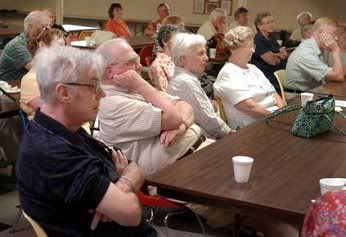 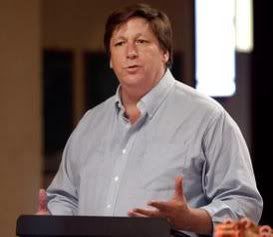
Olan Horne told a meeting of the Weymouth Voice of the Faithful that he will try to meet every American bishop he can, bringing the message that the church has an “extraordinary opportunity” to set things right.
“To move the Pope on this issue at this time – that’s light speed in Vatican time,” Horne said Tuesday at St. Albert the Great Church parish hall.
He went into the April meeting in a Washington, D.C., chapel with misgivings, but said he left encouraged.
“I’m knowing that this moment is symbolic and that a meeting with the Pope is not the place things get done, but he’s talking about it. He talked about it on the plane before he landed,” said Horne who has been an advocate for abuse victims.
Horne, of Lowell, was abused by a priest at St. Michael’s Church when he was 11.
Pope Benedict told the victims, “I wake up every day, and this is the first thing I pray about,” Horne said. The Pope said no one had read more accounts of abuse than him.
Horne said that at one point as they talked, Pope Benedict held both his hands.
“That’s a good touch. He grabbed me by the hands and pulled me in,” said Horne.
Horne said he wanted the Pope to understand that sexual abuse in the Catholic church is a systemic problem, and he told him that he had to speak to the issue more.
St. Albert the Great Church was scheduled to be closed in the wake of the sex abuse scandal.
Parishioners staged an around-the-clock vigil for 10 months to protest the closing and the church stayed open.
=====================================================================
John Allen files a related story.
Trust must be rebuilt
between priests and bishops,
says advisory body to US bishops
By JOHN L. ALLEN JR.
Orlando, Florida

June 12, 2008
A national advisory body to the U.S. bishops intended to represent “the church in miniature” has endorsed a “dialogue on the national level” with the country’s priests, in order to move towards “reestablishing trust” between bishops and priests damaged by the sexual abuse crisis.
That dialogue would be focused on implementation of the “Charter for the Protection of Children and Young People” adopted by the bishops in June 2002, though it would also consider broader questions in the relationship between bishops and priests.
The suggestion came from the National Advisory Council, a body of more than 40 laity, deacons, priests and religious intended to form a composite of the U.S. church in terms of geography, age, ethnicity and occupation.
The report from the council was delivered this morning by Archbishop Roger Schwietz of Anchorage, Alaska, one of three bishops who sit on the council. While technically the council is an advisory body to the Administrative Committee of the bishops’ conference, typically it delivers a report to the fully body of bishops as well.
The United States Conference of Catholic Bishops is meeting June 12-14 in Orlando, Florida.
Schwietz also told the bishops that the advisory council is “strongly supportive” of the proposed statement on embryonic stem cell research, up for a vote during the Orlando meeting.
The council, Schwietz said, is concerned about a “serious lack of knowledge and understanding among health care professionals, parishioners, clergy and religious about appropriate Catholic teaching” on the issue.
“U.S. Catholics and the general public are often confused about nature of embryonic stem cell research and the issues involved,” Schwietz said, summarizing the council’s discussions. “They are often misrepresented and misunderstood in the secular media and public perception.”
“U.S. Catholics and the general public deserves a clear, concise, unambiguous statement on this topic,” Schwietz said. In particular, he said, the council applauded the statement for stressing that “the Catholic church supports and encourages morally acceptable medical research and scientific progress.”
And then, there is news like this to remind us that some abuses took place even long after it had become a national scandal - form thenewspaper that serves the Lower Hudson Valley just north of New York City :
Yonkers friar sent to jail
for sexually abusing boys
By Louis Buccheri

June 10, 2008
WHITE PLAINS - A Yonkers monk charged with sexually abusing four boys from the same family was sentenced today to seven years in state prison, according to the Westchester County District Attorney's Office.
Dominic Bokulich, 35, pleaded guilty in March to first-degree sexual abuse and course of sexual conduct, felonies, and two misdemeanor counts of endangering the welfare of a child.
Bokulich, also known as Friar Leopold, sexually abused the boys at their home and at a retreat location operated by the Franciscan Friars of the Renewal, the congregation of which he was a member.
The incidents took place between November 2005 and June 2007.
During that time, one of the four boys, who range in age from 4 to 14, came forward and reported Bokulich.
Bokulich, who was living at St. Felix Friary in Yonkers at the time of the incidents, is now a resident of Monticello, N.Y.
He was also sentenced to five years post-release supervision and will be required to register as a sex offender, the prosecutor's office said.
====================================================================
I find this story doubly distressing because the Franciscan Friars of the Renewal was established in 1987 as a reform group and has earned a reputation for asceticism and its apostolate among New York's poor. Fr. Benedict Groeschel, familiar from EWTN broadcasts, was one of its founders.
[Modificato da TERESA BENEDETTA 12/06/2008 17:06] |
 12/06/2008 17:43 12/06/2008 17:43 |
|
| | | OFFLINE | | Post: 13.906 | Registrato il: 28/08/2005
| Utente Gold | |
|
  Vatican sets up anti-terrorist squad
Vatican sets up anti-terrorist squad
By Malcolm Moore in Rome

June 12, 2008
The Vatican has created an anti-terrorist unit in order to guard the Holy See and the Pope from a possible attack.
Vatican security forces now include an anti-bomb squad and a rapid response team, according to Domenico Giani, the head of the Holy See's 130-man gendarmerie.
The Vatican will also work more closely with Interpol to gather information on any threats, he said.
The deal with Europol, the pan-European police agency, will give the Vatican access to a large data bank of suspects and information on the latest anti-terrorism techniques.
"The teams report directly to the head of the Gendarmerie," said Mr Giani in an interview with L'Osservatore Romano, the official Vatican newspaper.
"The rapid response team will carry out investigations across the spread of information channels and will be supported by a sophisticated technical team. It will be able to intervene immediately in case of danger," said Mr Gianni.
"The second group is made up of highly-specialised experts, armed with sophisticated and innovative technology," he added.
He said the two teams would not be confined to the Vatican, but would also travel with the Pope.
The Swiss Guards have also been given anti-terrorism training, and now carry SIG P75 pistols and Heckler-Koch MP5 sub-machine guns, as well as their traditional halberds.
Earlier this year, Osama bin Laden repeated threats against Pope Benedict, who he accused of "leading a crusade against Islam".
The Pope has been the subject of a series of attacks [THREATS, NOT ATTACKS!] since 2006, when he used a quotation in a speech at Regensburg University that said Islam was an "evil and inhuman" religion.
Pope John Paul II was shot and wounded in St Peter's Square in 1983 by a Turkish gunman, Mehmet Ali Agca.
======================================================================
The story is based on an interview with security chief Giani published in the June 8 issue of L'Osservatore Romano - one of those articles I should translate but have not found time for. Still hope to - will post in PEOPLE AROUND THE POPE.
[Modificato da TERESA BENEDETTA 12/06/2008 17:47] |
 12/06/2008 18:32 12/06/2008 18:32 |
|
| | | OFFLINE | Post: 1.418 | Registrato il: 27/11/2005
| Utente Veteran | |
|
EWTN coverarge of Papa's weekend
Nothing about Saturday's events!
Thank you for your colourful reporting of the weekend's schedule - posters, maps etc. always much appreciated, Teresa! |
 12/06/2008 18:43 12/06/2008 18:43 |
|
| | | OFFLINE | | Post: 13.907 | Registrato il: 28/08/2005
| Utente Gold | |
|
  THE POPE'S DAY, 6/12/08
THE POPE'S DAY, 6/12/08
The Holy Father met today with
- Mons. Giovanni Bulaitis, Apostolic Nuncio to Albania;
- Bangladeshi bishops, Group 2 on ad limina visit.
- All Bangladeshi bishops on ad limina visit. Address in English.
- H.E. Fredrik Vahlquist, Ambascsador of Sqweden, on a farewell visit.
- H.E. Pavel Jajtner, Ambassador of the Czech Republic, on a farewell visit.
Pope to Bangladesh bishops:
'Foster unity and peace'
 
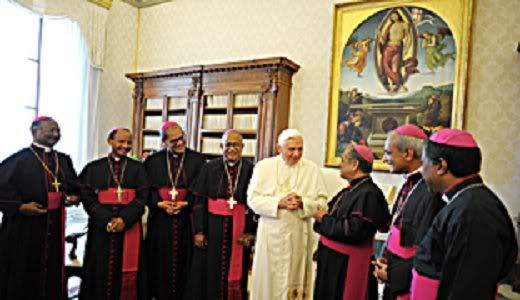
VATICAN CITY, 12 JUN 2008 (VIS) - "Personal integrity and holiness of life are essential components of a bishop's witness", Benedict XVI told prelates from the Catholic Bishop's Conference of Bangladesh, whom he received this morning in the Vatican at the end of their "ad limina" visit.
"Bishops are called to be patient, mild and gentle in the spirit of the beatitudes", he said in his English-language address. "In this way they lead others to see all human realities in the light of the Kingdom of Heaven. ... Many of your people suffer from poverty, isolation or discrimination, and they look to you for spiritual guidance that will lead them to recognise in faith, and to experience in anticipation, that they are truly blessed by God".
The Pope then went on to examine "the effective transmission of the deposit of faith", highlighting the importance of ensuring that "lay catechists are sufficient in number, well prepared and given due recognition by the faithful. ... As you know from your own pastoral experience, catechists play an integral role in preparing lay people to receive the Sacraments. This is especially true in the increasingly important work of preparing young men and women to recognise the Sacrament of Matrimony as a life-long covenant of faithful love and as a path to holiness.
"I have often mentioned", he added, "my concern regarding the difficulty modern men and women have in making a lifelong commitment. There is an urgent need on the part of all Christians to reassert the joy of total self-giving in response to the radical call of the Gospel. One clear sign of this radical commitment is seen in the many vocations to the priesthood and the consecrated life the Church in your country is currently experiencing".
"The Church is Catholic: a community embracing peoples of all races and languages, and not limited to any one culture or particular social, economic or political system. ... This gives her a connatural ability to foster unity and peace.
"My dear brothers", he told the Bangladeshi prelates, "you have much to offer the nation. In your love for your country you inspire tolerance, moderation and understanding. By encouraging people who share important values to co-operate for the common good, you help to consolidate your country's stability and to maintain it for the future. These efforts, however subtle, give effective support to the majority of your fellow citizens who uphold the country's noble tradition of mutual respect, tolerance and social harmony".
Pope Benedict then turned his attention to inter-religious dialogue, which he described as an "essential component of the Church's mission 'ad gentes'". Such dialogue, "based on mutual respect and truth, cannot fail to have a positive influence on the social climate of your country. The delicacy of this task requires thorough preparation of clergy and lay people, first of all by offering them a deeper knowledge of their own faith and then by helping them to grow in their understanding of Islam, Hinduism, Buddhism and the other religions present in your region".
Finally, the Holy Father mentioned the forthcoming Pauline year, "which will be for the whole Church a renewed invitation to announce with unfailing courage the Good News of Christ Jesus. ... I am aware of the difficulties of this mission entrusted to you. Like the first Christians, you live as a small community among a large non-Christian population. Your presence is a sign that the preaching of the Gospel, which began in Jerusalem and Judea, continues to spread to the ends of the earth in accordance with the universal destination the Lord willed for it".
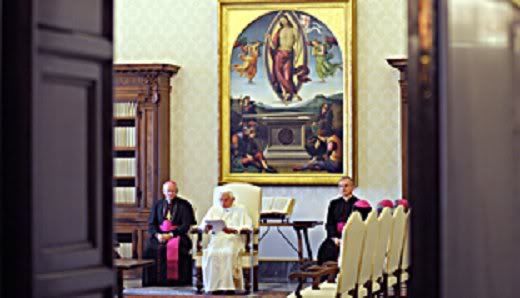 Pope tells Bangladesh bishops
Pope tells Bangladesh bishops
to champion marriage
 
Vatican City, June 12 (dpa) - Pope Benedict XVI received Thursday a group of bishops from Bangladesh, urging them do more to help men and women in their country prepare for married life. "Many of your people suffer from poverty, isolation or discrimination, and they look to you for spiritual guidance," Benedict told the prelates during a meeting at the Vatican.
Bishops who are called to be "be patient, mild and gentle" should ensure that a sufficient number of lay Catholics be trained in spreading the Church's teachings, especially in preparing couples for marriage, the Pontiff said.
Such training was need to help young men and women recognize that matrimony is a "life-long covenant of faithful love," and "a path to holiness," Benedict said.
The Pope also spoke of the "many vocations" by men and women who have chosen to become priests or nuns in Bangladesh, a Muslim majority country where Catholics account for less than 0.3 per cent of the population, estimated to number 150 million.
Benedict also told the bishops of the importance of inter- religious dialogue based on mutual respect and truth which, he said, "cannot fail to have a positive influence on the social climate of your country".
To achieve this, lay Catholics needed to be prepared by the Church with a deeper knowledge of their own faith and also an "understanding of Islam, Hinduism, Buddhism and the other religions present in your region," Benedict said.
======================================================================
POPE NAMES CARDINALS
TO NEW CURIAL MEMBERSHIPS
 
VATICAN CITY, 12 JUN 2008 (VIS) - The Holy Father today made the following appointments:
- As a member of the Congregation for the Oriental Churches, Cardinal Angelo Bagnasco, archbishop of Genoa, Italy.
- As members of the Congregation for Divine Worship and the Discipline of the Sacraments, Cardinal Agustin Garcia-Gasco Vicente, archbishop of Valencia, Spain; Cardinal Angelo Bagnasco, archbishop of Genoa, Italy; Cardinal Theodore-Adrien Sarr, archbishop of Dakar, Senegal, and Cardinal John Patrick Foley, grand master of the Equestrian Order of the Knights of the Holy Sepulchre of Jerusalem.
- As members of the Congregation for the Causes of Saints, Cardinal Paul Josef Cordes, president of the Pontifical Council "Cor Unum"; Cardinal Angelo Comastri, archpriest of the papal basilica of St. Peter's in the Vatican, vicar general of His Holiness for Vatican City and president of the Fabric of St. Peter's; Cardinal Stanislaw Rylko, president of the Pontifical Council for the Laity, and Cardinal Raffaele Farina S.D.B., archivist and librarian of Holy Roman Church.
- As members of the Congregation for Bishops, Cardinal Andre Vingt-Trois, archbishop of Paris, France; Cardinal Angelo Bagnasco, archbishop of Genoa, Italy; Cardinal Giovanni Lajolo, president of the Pontifical Commission for Vatican City State and of the Governorate of Vatican City State, and Cardinal Stanislaw Rylko, president of the Pontifical Council for the Laity.
- As members of the Congregation for the Evangelisation of Peoples, Cardinal Theodore-Adrien Sarr, archbishop of Dakar, Senegal; Cardinal John Njue, archbishop of Nairobi, Kenya; Cardinal Leonardo Sandri, prefect of the Congregation for the Oriental Churches; Cardinal John Patrick Foley, grand master of the Equestrian Order of the Knights of the Holy Sepulchre of Jerusalem, and Cardinal Paul Josef Cordes, president of the Pontifical Council "Cor Unum".
- As members of the Congregation for the Clergy, Cardinal Odilo Pedro Scherer, archbishop of Sao Paulo, Brazil; Cardinal John Njue, archbishop of Nairobi, Kenya, and Cardinal Paul Josef Cordes, president of the Pontifical Council "Cor Unum".
- As a member of the Congregation for Catholic Education, Cardinal Raffaele Farina S.D.B., archivist and librarian of Holy Roman Church.
- As a member of the Supreme Tribunal of the Apostolic Signatura, Cardinal Lluis Martinez Sistach of Barcelona, Spain.
- As a member of the Pontifical Council for the Laity, Cardinal Lluis Martinez Sistach of Barcelona, Spain.
- As members of the Pontifical Council for Promoting Christian Unity, Cardinal Sean Baptist Brady, archbishop of Armagh, Ireland, and Cardinal Leonardo Sandri, prefect of the Congregation for the Oriental Churches.
- As members of the presidential committee of the Pontifical Council for the Family, Cardinal Agustin Garcia-Gasco Vicente, archbishop of Valencia, Spain, and Cardinal Andre Vingt-Trois, archbishop of Paris, France.
- As a member of the Pontifical Council for Justice and Peace, Cardinal Paul Josef Cordes, president of the Pontifical Council "Cor Unum".
- As a member of the Pontifical Council for the Pastoral Care of Migrants and Itinerant Peoples, Cardinal Daniel N. DiNardo, archbishop of Galveston- Houston, U.S.A.
- As a member of the Pontifical Council for Inter-religious Dialogue, Cardinal Leonardo Sandri, prefect of the Congregation for the Oriental Churches.
- As a member of the Pontifical Council for Culture, Cardinal Giovanni Lajolo, president of the Pontifical Commission for Vatican City State and of the Governorate of Vatican City State.
- As a member of the Administration of the Patrimony of the Apostolic See, Cardinal Giovanni Lajolo, president of the Pontifical Commission for Vatican City State and of the Governorate of Vatican City State.
- As members of the Pontifical Commission for Latin America, Cardinal Francisco Robles Ortega, archbishop of Monterrey, Mexico, and Cardinal Stanislaw Rylko, president of the Pontifical Council for the Laity.
- As members of the Pontifical Commission for the Cultural Patrimony of the Church, Cardinal Sean Baptist Brady, archbishop of Armagh, Ireland, and Cardinal Raffaele Farina S.D.B., archivist and librarian of Holy Roman Church.
TOWARDS THE OCTOBER BISHOPS SYNOD:
Working document presented
 
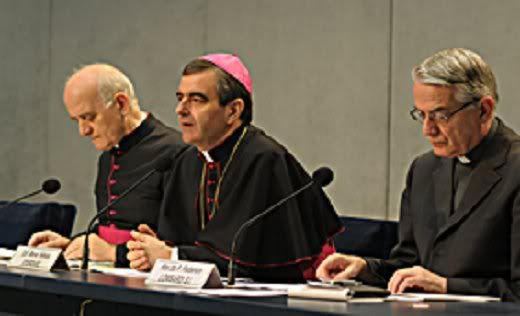
VATICAN CITY, 12 JUN 2008 (VIS) - At the Holy See Press Office this morning, Archbishop Nikola Eterovic, secretary general of the Synod of Bishops, presented the Instrumentum laboris (working document) for the Twelfth Ordinary General Assembly of the Synod of Bishops, called by Pope Benedict XVI for October 5-26 this year on the theme: "The Word of God in the Life and the Mission of the Church".
Archbishop Eterovic explained that the aim of the assembly is, above all, "of a pastoral and missionary character", and "will have two important points of reference. The first is the previous Synod on the Eucharist, and the second is the Pauline Year which will begin on 28 June".
In this context he said "the memory of St. Paul, Apostle of the Gentiles, will not fail to arouse a renewed missionary drive in the Church, for the benefit of all humanity. The centre of such dynamism remains the Sunday celebration of the Eucharist", he said.
The Instrumentum laboris, released in English, French, Spanish, Italian, German, Portuguese and Polish, is divided into three parts: (1) The Mystery of God Who Speaks to Us; (2) The Word of God in the Life of the Church; (3) The Word of God in the Mission of the Church.
Part one is subdivided into three chapters. "The first chapter", Mons. Eterovic said, "seeks to explain the scope of the term 'Word of God'"; Chapter 2 "is dedicated to the subject of the inspiration and truth of Holy Scripture, and to its relationship with the Word of God"; it also contains reflections on the relationship between Tradition, Scripture and Magisterium for a correct ecclesial interpretation of Holy Writ"; and Chapter 3 concentrates on the "the disposition believers should have towards the Word of God: listening to God Who speaks".
The second section has two chapters, the first of which "makes it clear that the Word of God gives life to the Church, which is born and lives by the Word of God". Chapter 2 of this section "describes the Word of God in the many services of the Church. The ministry of the Word, which has various modes of expression, finds a privileged place in liturgical celebrations", Eterovic said.
"It is necessary, then," he went on, "to exercise particular care over the liturgy of the Word, the readings, the homily and the prayer of the faithful, which are essential parts of the Mass". The document, he said, also "underlines the importance of studying theology - and especially exegesis - in accordance with the orientation of the Church, in other words interpreting Scripture in the context of the Church's living Tradition, giving due weight to the patrimony of the Fathers and listening to the indications of the Magisterium".
Part 3 three of Instrumentum laboris has three chapters: "The first reiterates the Church's mission to proclaim the Word of God ... through evangelisation and catechesis"; Chapter 2 "indicates how to put into effect the faithful's shared vocation to receive and give the Word of God" in accordance with the tasks and responsibilities of each within the Church; and "Chapter 3 is dedicated to ecumenical and inter-religious relations".
Eterovic pointed out that "Sacred Scripture is an important bond of unity with other Christians", and that "there exists a special relationship uniting Christians and Jews, with whom they share a large part of Scripture".
This chapter also contains "important considerations concerning faithful of other religions, ... especially Islam. Even though Christianity is more the religion of the person of Jesus Christ and not of the Book, Holy Scripture is an important aspect of inter-religious dialogue".
Closing his remarks, the secretary general of the Synod mentioned Benedict XVI's contribution to the working document. The Pope, he said, "has spoken about Holy Scripture many times, enriching theological and spiritual reflections on the subject. The topic has also been the subject of many of his written works, from his commentaries on the Vatican Council II Dogmatic Constitution Dei Verbum, to his book Jesus of Nazareth".
======================================================================
Vatican confirms Pope Benedict
has given definite approval
to statutes of Neo-Catechumenal Way

ATICAN CITY, June 12 (Translated from Apcom) - Pope Benedict XVI has given his definitive approval to the statues of the Neo Catechumenal Way, an ecclesial movement founded in Spain in 1964.
 
The Pontifical Council for the Laity confirmed this today following speculation in recent weeks that the approval - due since late 2005 when the probational approval given in 2000 by John Paul II expired - had been given. [PETRUS reported that the approval by Benedict XVI was likely for another 7 years of probation.]
"This action has required many consultations at various levels," said a note from the Council to be published in tomorrow's (6/13) issue of L'Osservatore Romano. The approved statutes are to be handed to the leaders of the movement tomorrow afternoon. The statues were reportedly approved last Easter Sunday.
The note continues:
"During the probationary period ('ad experimentum'], the Council noted the many fruits that the Way has brought to the Church in the area of new evangelization through catechetical-liturgical practices which ave developed in the 40 years of its existence.
"Thus, after an attentive review of the statutory texts and the insertion of some modifications deemed necessary, the Pontifical Council for the Laity decided to recommend final approval.
"It is to be hoped that this can be a valid instrument in the service of this ecclesial entity in order to conitune contributing to teh good of the whole Church."
NB: The modifications referred to were not specified, but it is known that the Neo-Catechumenals were asked by Pope Benedict XVI and the Congregation for Divine Worship to change their liturgical practices having to do with Communion, celebration of Sunday Mass, and lay homilies, to conform to the rest of the Church, but have reportedly failed to comply.
The previous post about this is on Page 187 of this thread (Post #13628, towards the bottom of the page). Obviously, the Vatican is satisfied that something has been done or is being done about the reservations that have been expressed about the movement - including complaints by at least two foreign dioceses of their failure to coordinate their activities with the local diocese in which they operate.
[Modificato da TERESA BENEDETTA 12/06/2008 21:55] |
 13/06/2008 02:09 13/06/2008 02:09 |
|
| | | OFFLINE | | Post: 13.910 | Registrato il: 28/08/2005
| Utente Gold | |
|
  PASTORAL VISIT TO LEUCA AND BRINDISI, June 14-15, 2008
PASTORAL VISIT TO LEUCA AND BRINDISI, June 14-15, 2008
   BENEDICT XVI'S 10th PASTORAL TRIP IN ITALY:
BENEDICT XVI'S 10th PASTORAL TRIP IN ITALY:
Puglia awaits the Pope

 Interview with Mons Vito De Grisantis
Interview with Mons Vito De Grisantis
Bishop of Ugento-Santa Maria di Leuca
By ROMA MIMMO MUOLO
Translated from
the 6/11/08 issue of

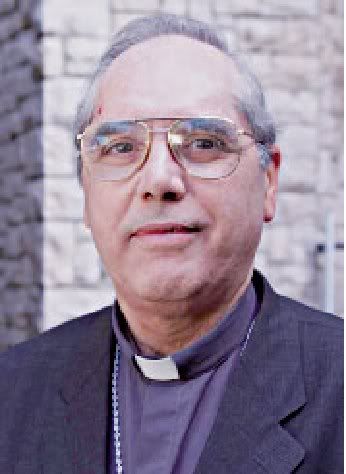
It all started with a light-hearted exchange a few months after Benedict XVI had become Pope. Receiving the homage of Mons. Vito De Grisantis at the annual plenary assembly of the Italian bishops conference, the Pope remarked to him: "In your diocese, you have a beautiful Marian shrine."
De Grisantis, Bishop of Ugento-Santa Maria di Leuca promptly replied: "Holiness, why don't you come and visit it?"
Said and about to be done. On Saturday, Benedict XVI will enter the Shrine to Santa Maria di Leuca, situated at 'land's end' in southeastern Italy, at the point where the Adriatic Sea joins the Ionian Sea.
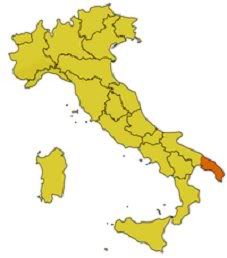 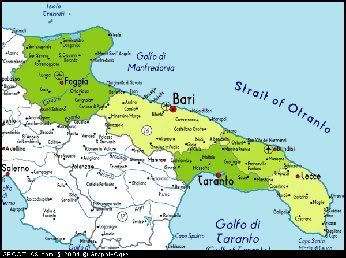 At right, Leuca is at the southernmost tip of the Salento peninsula.
At right, Leuca is at the southernmost tip of the Salento peninsula.
Says Mons. De Grisantis, 66, and bishop of the diocese since 2000: "The Holy Father's visit will have several symbolic significances, starting with the particular geographic location of our shrine."
Tell us what this place of worship means for the people of your diocese.
The Basilica of Santa Maria de Finibus Terrae ('Blessed Mary at Land's End' - formal title of the Virgin venerated there) is the symbol of our diocese's evangelization. According to a deep-rooted tradition, it was St. Peter himself who debarked on teh coast of Leuca to first announce the Gospel in this part of Puglia.
Then, where there had been once a great temple dedicated to the goddess Minerva (Roman name for the Greek Athena, goddess of wisdom), a shrine to the Virgin Mary was erected.
So for our people, Leuca was the point from which the evangelization of the region began. We are very attached to this shrine which was attacked so many times and destroyed by the Saracens (Muslims), that the present edifice dates to the 18th century. At that time, the bishop had it rebuilt to resemble more a secular edifice than a church, in order to minimize the chances it would be targeted again.
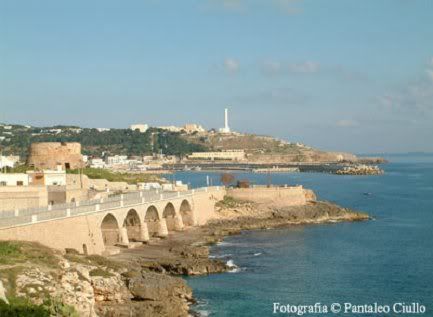 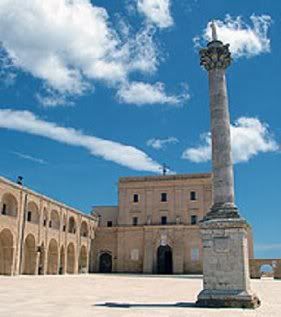 Left, the Basilica is located at the top of the promontory to the left of the lighthouse; right, the Basilica of Santa Maria di Finibus Terrae.
So, among the many symbologies of this papal visit would be 'the return of Peter'.
Left, the Basilica is located at the top of the promontory to the left of the lighthouse; right, the Basilica of Santa Maria di Finibus Terrae.
So, among the many symbologies of this papal visit would be 'the return of Peter'.
Yes, we are preparing to welcome the Successor of the Prince of Apostles, so we can be confirmed in our faith and strengthened in our attachment to the Gospel.
In addition, in this shrine that 'masquerades' as a secular building, there is the desire of the diocese to be a Church of the people, of being 'close to home' for our people - where faith is not separate from life but shapes life itself and orients it to higher values.
What are the problems that your diocese must face daily?
Even here, it's the problem of secularization. That is why the Holy Father's visit is very timely. His teaching is profound but at the same time within the grasp of everybody, and it invites us to reflect on the one hand, on an existence that is lived etsi Deus non daretur - as if God does not exist - and on the other, to encourage a new encounter between faith and reason.
We look forward to the Pope's words to confirm us in our commitment and to help us win over the dangers of secularism adn ethical relativism.
Thank God that popular religiosity is so rooted in our people, but we must also help make their attachment to Jesus and the Gospel more profound.
In the past few months since the Pope's visit was announced, you have been emphasizing the economic problems of this part of Salento [Salento is the peninsula that forms the 'heel' of the Italian 'boot'.]
Because that is the other great problem of our region. Unemployment is really becoming an open wound. The crisis in the textile and shoemaking industries has left many families destitute. The Parish priests keep telling me, "We don't know what to do in the face of requests for assistance."
I am visited by many persons who come to tell me of their family emergencies. Then, of course, this means we have an intellectual migration problem, because the young and educated people go to other regions to find work. And that is another form of impoverishment.
From a civilian point of view, we hope the visit will prod all institutions towards more concrete progress, towards solutions that are rooted in the social fabric of the South. I am hoping that the Pope's visit will stimulate the regional, provincial and local governments to work with local institutions for genuine development in the region.
At one time, it was Saracens. Today, you are getting poor people from other countries like Albania disembarking on our shores. So the sea here is a symbol for welcome and solidarity.
That's true. Even if we are not really a target for massive immigration, we have the duty to welcome legal immigrants and to dialog with new residents. Not just Leuca but all of Puglia is called on to do this, so the Pope's visit can only help us to be better at this.
LEUCA'S TRADITIONS:
Peter stopped over on his way to Rome
and St. Luke painted the first Madonna
venerated at the Shrine
by LUIGI RUSSO
Translated from
the 6/11/08 issue of

The Basilica of Santa Maria de Finibus Terrae, which will be Pope Benedict's first stop on Saturday, has its roots in the very early years of Christianity.
According to tradition, Leuca was St. {Peter's first stop in Italy on his way to Rome from Jerusalem. It is a tradition supported by a wealth of local 'testimonials': churches, memorial stone tablets, crosses erected along Peter's land route, places commemorating his passage.
There is a Petrine cross in the pine forest next to the Shrine; the churches of St. Peter in Galatina, St. Peter in Giuliano, St. peter in Lama, St. Peter Vernotico, etc.
One of the oldest stone tablets now embedded in the central doorway of the Basilica's atrium reads: "The divine Peter banished the worship of idols from this temple, and in the year 43, his disciples dedicated it to the Virgin Mother of God announced by the Angel. In the year 59, it was designated an episcopal See."
Further, tradition says that some Leuchesi then went to Malta, where the evangelist Luke was carrying out a mission and asked him to paint the Madonna that was first venerated at the shrine. "She had the Baby Jesus on her lap, with his right arm raised in blessing. On one side, was St. Peter genuflecting with the Keys of the Kingdom and the Scriptures in his hand; on the other, St. Paul with the Gospel and a sword."
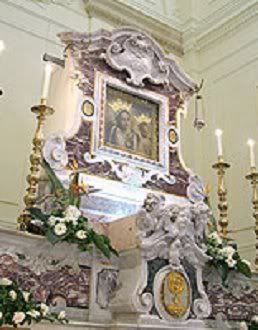 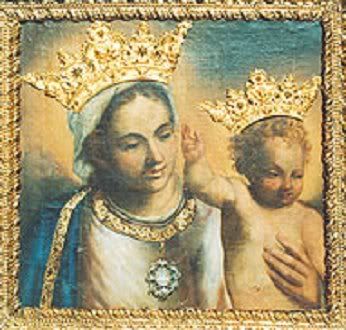 Left, view of Leuca from below - the Basilica is to the left of the lighthouse on the promontory; right, the image of the Madonna of Leuca.
[For some reason, the Avvenire story about the image is incomplete. Here is what the Shrine website says about it: The image now enshrined at the main altar is the third of its kind. A second image replaced that of St. Luke in the third century but was destroyed during the persecutions of the Emperor Galatius in 293-311. In 1507, the local bishop commissioned a pupil of Titian, Giacomo Palma, to reproduce St. Luke's painting. A fire in 1624 burned the altar and its adornments, but the upper part of the painting showing the faces of Mary and Jesus miraculously survived. That is the part that is still venerated today.]
Left, view of Leuca from below - the Basilica is to the left of the lighthouse on the promontory; right, the image of the Madonna of Leuca.
[For some reason, the Avvenire story about the image is incomplete. Here is what the Shrine website says about it: The image now enshrined at the main altar is the third of its kind. A second image replaced that of St. Luke in the third century but was destroyed during the persecutions of the Emperor Galatius in 293-311. In 1507, the local bishop commissioned a pupil of Titian, Giacomo Palma, to reproduce St. Luke's painting. A fire in 1624 burned the altar and its adornments, but the upper part of the painting showing the faces of Mary and Jesus miraculously survived. That is the part that is still venerated today.]
The church itself was destroyed five times by pirates, Turks and Saracens. Each time, it was rebuilt following the original perimeters.
======================================================================
Interview with Mons. Rocco Talucci
Bishop of Brindisi-Ostuni
By Mimmo Muolo
Translated from
the 6/11/08 issue of

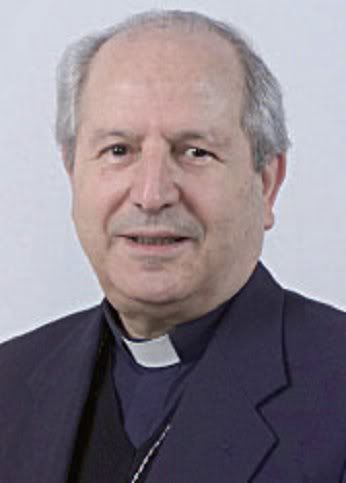
He calls Brindisi 'a city without frongtiers, a door to the Orient, a terrace on the Mediterranean'. Therefore, he would like it to be "always open to the Gospel and to the dialog between faith and reason."
"The Pope's visit will certainly help us," says Archbishop Rocco Talucci on the eve of the much-awaited event. "The expectation is not simply from curiosity. We are convinced that the encounter with the Successor of Peter will be a true grace for the city."
Born in Lucca, Mons. Talucci, 72, has been in Brindisi since 2000, and knows the lights and shadows of his diocese quite well.
What is the face that the Church of Brindisi-Ostuni will show the Pope this weekend?
We are going through a significant phase of our current history, because we must announce the Gospel of hope in a region that is just emerging from a very grave situation. A region that has recently known criminality, illegality, and economic crisis, but has also shown a capacity for hospitality, as when we had to deal with the arrival of 20,000 Albanians at our port. Today, there is a strong sense of a will for rebirth, and the Church is contributing by keeping hope alive.
Benedict XVI's Magisterium often refers to hope. What stimuli do you expect from his addresses?
Several times the Holy Father has also called for a widening of the space for reason. I hope he will make the same appeal in Brindisi, where there is an intellectual ambiance with great potential, but it has been rather indifferent to social challenges as well as to the faith.
But in order for us to turn the page on the problems which plague us (for example, a rather forced industrialization which has not produced the desired results and has not even created the right mentality for development). Everyone needs to contribute. It's not enough to say, "Let's close the door on the past' without laying down the premises for a better future. It's not enough to have culture, if this is not placed in the service of the common good.
So Brindisi hopes to profit from this visit to get it going?
Exactly. If only because this city has in many ways sought to carry out John Paul II's 'Duc in altum' ['Put out into the deep' - Jesus's words to Peter about venturing further after a long night's work without catching any fish; used by John Paul in his Apostolic Letter Novo millennio ineunte]
I wish that this visit can help us to overcome some divisions and mistrusts between Catholics on one side and secular intellectuals on the other. I would like to think it will be an occasion for a reciprocal stimulus - for the intellectuals to undertake dialog with the faith, and for the ecclesial community, to announce the Gospel as a proposition that widesn the horizons of reason.

[DIM11pt[=DIM] Ecclesially, what are the motivations for this visit?
Quite a few. Brindisi is a city without frontiers, a doorway to the Orient, a terrace on the Mediterranean. It is also the United Nations headquarters for humanitarian aid to poor nations. We would like Brindisi to be the point from which messages of piece and brotherhood go out to the eastern and southern hemispheres. Therefore, the first reason I see is to promote this vocation of openness and peace.
Then there is the relationship with the Orthodox Christians, in which sense Brindisi is a doorway to the Orient not only at the comemrcial and political levels, but also ecumenically.
You have been holding your diocesan synod. How does the papal visit fit in?
We will still be a Church in synod, after this visit. We have just built a new seminary, which will be ianugrated on Sunday and will be called the Benedict XVI Archiepiscopal Seminary. We wish the local Church to grow in communion and in missionary capacity. So the Pope's visit will certainly give us fresh impetus.
In the early years after 1000, Pope Urban II visited Brindisi and blessed the perimeter on which the Cathedral was later built. After a thousand years, another Successor of Peter is coming back providentially to bless our entire diocesan Church.
You referred to the city's social problems? How has the Church been helping out?
These past few years, we have been trying to apply the gospel of hope in relation to our people's expectations. To the problems of work, the youth, our culture, the environment. We have tried not to neglect any field of civilian living. In this, Christian charity can be an incentive for development, for brotherly solidarity and for social justice.
ST. LAWRENCE OF BRINDISI,
DOCTOR OF THE CHURCH, 1559-1619
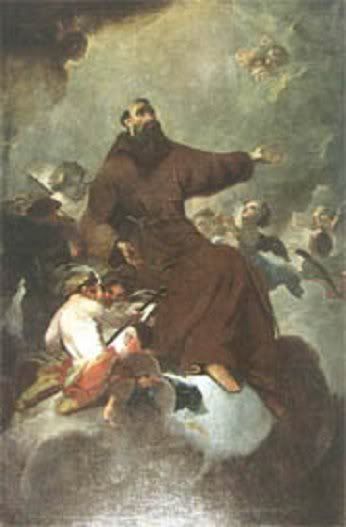
Clarity in dialog, a commitment to the very least of beings, utter trust in Mary to unify Christians.
From the Adriatic coast looking to the East, an exemplary figure appropriately awaits Benedict XVI - the church's 'Doctor Apostolicus', St. Lawrence of Brindisi, who was a friar-general of the Capuchins, beatified by Pius VI in 1783, canonized in 1881 by Leo XIII, and proclaimed a Doctor of the Church by John XXIII in 1959.
At first glance perhaps the most remarkable quality of Lawrence of Brindisi is his outstanding gift of languages. In addition to a thorough knowledge of his native Italian, he had complete reading and speaking ability in Latin, Hebrew, Greek, German, Bohemian, Spanish and French.
He was born Giulio Cesare Russo in Brindisi on July 22, 1559, and died exactly 60 years later on his birthday in 1619. After the early death of his parents, he was educated by his uncle at the College of St. Mark in Venice.
When he was just 16 he entered the Capuchin Franciscan Order in Venice and received the name of Lawrence. He completed his studies of philosophy and theology at the University of Padua and was ordained a priest at 23.
With his facility for languages he was able to study the Bible in its original texts. At the request of Pope Clement VIII, he spent much time preaching to the Jews in Italy. So excellent was his knowledge of Hebrew, the rabbis felt sure he was a Jew who had become a Christian.
In 1956 the Capuchins completed a 15-volume edition of his writings. Eleven of these contain his sermons, each of which relies chiefly on scriptural quotations to illustrate his teaching.
Lawrence’s sensitivity to the needs of people — a character trait perhaps unexpected in such a talented scholar — began to surface early. He was elected major superior of the Capuchin Franciscan province of Tuscany at the age of 31. He had the combination of brilliance, human compassion and administrative skill needed to carry out his duties. In rapid succession he was promoted by his fellow Capuchins and was elected minister general of the Capuchins in 1602. In this position he was responsible for great growth and geographical expansion of the Order.
Lawrence was appointed papal emissary and peacemaker, a job which took him to a number of foreign countries. An effort to achieve peace in his native kingdom of Naples took him on a journey to Lisbon to visit the king of Spain. Serious illness in Lisbon took his life in 1619.
His constant devotion to Scripture, coupled with great sensitivity to the needs of people, present a lifestyle which appeals to Christians today. Lawrence had a balance in his life that blended self-discipline with a keen appreciation for the needs of those whom he was called to serve.
His monumental work was the 'Mariale' - all about Mary, Mother of God - about which scholars have said, "Many have written much about Mary, but none better than he."
When he became superior of the Capuchins, he had the Church of Santa Maria degli Angeli built on the site of his natal home in Brindisi.
[Modificato da TERESA BENEDETTA 13/06/2008 07:01] |
|
|
|
|